
THE VOICE OF INTERNATIONAL LITHUANIA
|
VilNews has its own Google archive! Type a word in the above search box to find any article.
You can also follow us on Facebook. We have two different pages. Click to open and join.
|
Featured
The Molotov – Ribbentrop Pact
- Posted by - (1) Comment
|
Part 1 of 2: |
THE MOLOTOV - RIBBENTROP PACT: THE DOCUMENTS
Dear Readers,
In this part 1 of 2 articles about the Molotov – Ribbentrop Pact and the Secret Protocols, you will get some insight as to when and why the Pact and Secret Protocols were made public and the work that has done to verify to authenticity of the copies of the documents now available.
INTRODUCTION by EDITOR SAULIUS SUŽIEDĖLIS
The day after the signing of the German-Soviet Nonaggression Pact of 23 August 1939, Soviet and German newspapers carried the news and text of the treaty to a stunned Europe. However, from the very beginning there was well-founded suspicion that the Pact contained more than met the eye. According to Richard Maasing, an officer in the Estonian general staff, the Estonian military had realized by 26 August that the Pact divided the Baltic States into German and Soviet spheres of interest and that Estonia had been assigned to the latter. It seems that the Latvian diplomatic service also learned of the contents of the Pact soon after the signing and that rumors about Germany turning over Latvia to Russia proliferated. Thus, while the exact contents of the secret protocol of 23 August and the subsequent secret arrangements of 28 September 1939 were unknown to the governments of the Baltic states, and knowledge of the texts was restricted to a small number of German and Soviet officials, the general outline of the agreements on "spheres of influence" was either known or strongly suspected very soon after they were concluded.
Moreover, despite the provisions on strict secrecy, Stalin and Molotov leaked the fact of their secret agreement with the Germans on the spheres of influence during negotiations with Baltic leaders in Moscow as part of the Soviet strategy of pressuring the Baltic governments into accepting the mutual defense pacts with the USSR. This is confirmed by a number of different sources, including the Lithuanian Foreign Minister Juozas Urbšys and Gen. Stasys Raštikis, the Commander of the Lithuanian Armed Forces during the negotiations in Moscow in early October 1939. The Soviets informed the Germans of their indiscretion; the leaks to the Baltic ministers irritated the Germans who clumsily attempted to diminish the importance of the secret Pact provisions in their replies to the astonished and perturbed Baltic representatives. It is inconceivable that news of the German-Soviet horsetrading concerning the Baltic States did not subsequently come to the attention of the Western powers.
The exact details of the secret territorial provisions of the German-Soviet Nonaggression Pact of 23 August 1939, the German-Soviet Boundaries and Friendship Treaty of 28 September, and the Secret Protocol of 10 January 1941 (concerning the so-called Suwalki Strip), were unknown until the appearance of copies of the secret protocols in the West after the Second World War. It came to the public's attention for the first time as a defense document in the Nuremberg Trials in 1946 and has since been quoted in numerous publications. The description of the secret protocol of 23 August 1939 in the Estonian-language CP daily Rahva Haal of 10 August 1988 (published a week later in Sovetskaya Estoniya) suggested that the original is held by the Foreign Ministry Archive of the German Federal Republic in Bonn. For his part, Valentin Falin, then head of TASS, reiterated at a Moscow press conference that no original of the secret protocol has ever been found.
In a strictly technical sense, Mr. Falin was right. According to American scholars who worked on the mammoth project of classifying and filming captured German records after the war, the originals of many of the most important documents of the Reich's Foreign Office (Auswaertigen Amt) were, in fact, never found. In 1943, as the archives of the German Foreign Office were being evacuated from Berlin because of the Allied air attacks, Reich Foreign Minister Joachim von Ribbentrop ordered the filming of the most important papers. The work was carried out by Paul Otto Schmidt, the chief interpreter of the Reich Foreign Office. Karl von Loesch, Schmidt's assistant, placed the films into boxes and buried them. Thus, these films survived the destruction of many important Foreign Office records carried out by the Nazis themselves at the close of the war. In late May 1945 Loesch met Lt. Col. R.C. Thomson, chief of the British documents team, and the so-called Loesch films became part of the Captured German Records project. The German-Russian treaties of 23 August 1939 and 28 September 1939, together with their secret protocols, were found in the films of Ribbentrop's working files. (These are contained in part of the series F1-F19 in the German Foreign Office collections).
Over the years, some East Bloc officials and scholars have either ignored the secret protocols of the German-Soviet treaties, or have presented them as Western forgeries. There are a number of reasons and circumstances that virtually eliminate the possibility that the secret protocols are fakes. As mentioned above, the existence of the protocols was revealed to Baltic statesmen in the autumn of 1939. The Germans, when confronted by indications that territorial arrangements had been worked out between the Reich and the Soviet Union, did not actually deny the existence of such agreements at the time. The behavior of both the Soviet and German governments during 1939-1941 indicates a basic understanding of each other's territorial prerogatives in Eastern Europe.
Of course, circumstantial evidence of the existence of an agreement does not address the possibility that understandings different from those described in the secret protocols had been undertaken. However, in addition to forensic testing of an actual original or authentic carbon copy, there are other ways of ascertaining the authenticity of a historic document. As medieval and early modern specialists know, few important historical documents have survived in the original. Often we deal with copies of copies made at a later date; sometimes, documents are excerpted in commentaries, that is, secondary works, and other texts written many years after the fact. In other words, we often learn about texts from references to them in other texts. Naturally, the situation is much better for the nineteenth and twentieth centuries. Yet any overview of references to the Molotov-Ribbentrop Pact contained in captured German correspondence makes the theory of a forgery extremely unlikely if downright impossible.
The number of references, partial quotes from, and allusions to the secret protocols in the available collections of diplomatic documents after the war is quite impressive. The various references can be grouped as follows:
(a) the preliminary diplomatic exchanges in July and August 1939 concerning German and Soviet diplomats;
(b) the correspondence between 23 August and the end of October 1939;
(c) the exchanges of views concerning the territorial changes of summer 1940 ending with Molotov's visit to Berlin in November 1940;
(d) the final period before the German attack on the Soviet Union, November 1940-June 1941. The evidence for the authenticity of the secret protocols is overwhelming, even if we ignored the memoir literature of the participants themselves.
The way in which the details of the various exchanges of correspondence concerning Poland, the Baltic States and Bessarabia, the territories explicitly named in the German-Soviet correspondence, dovetail with the provisions of the secret protocols, as well as with actual German and Soviet diplomacy, is striking. Any assumption that the secret protocols were a creation would lead to the conclusion that the hundreds of documents which refer to and quote the protocols would also have to be forgeries. That someone could succeed in such a task strains credibility. No forgerer will go out of his way to make a task unnecessarily complicated by increasing the number of factual variables, thus risking exposure. Certainly any creator of these numerous "supporting" documents would have to be aware of the probability that Soviet archives would contain records conflicting with the accounts of events contained in supposedly forged correspondence of the German Foreign Office.
It is important to remember that there is an immense difference between (a) documenting a nonexistent event or communication for propaganda purposes, a well-known disinformation stratagem, and (b) structuring a forged document, which distorts an otherwise real event in the more distant past, involving real personalities interacting within a complex bureaucracy. The first type of fabrication is relatively simple and risk-free; it normally requires the creation of only a single document and is a "one-shot" operation. From the forgerer's point of view, the fictitious event cannot be, and need not be, proven or disproven. It can always be affirmed as long as there are those willing to believe the lie.
However, the second type of creation is enormously difficult and, in fact, quite risky for the forger. The danger of discovery is particularly acute if the event in question, such as the negotiation and conclusion of the German-Soviet Nonaggression Pact, is some distance in the past and well-documented by voluminous primary sources. Physical expertise in document creation is of limited help here. Total control over all sources of documentation of the broader historical event in question is the only way to assure success in fabrication. Everything must fit perfectly; every additional fiction necessary to construct the lie considerably increases the number of variables to be taken into account and compounds the risk of detection. The fabricated structure must correspond exactly to the past, both the known and the yet-to-be-discovered. It must fit precisely within the continuum of historical time. The enterprise requires a domination of the past and present as thorough as that envisioned in Orwell's 1984. In real life, particularly in situations where documentation is abundant and scattered among different jurisdictions, this sort of total control over the sources is virtually impossible to achieve.
The fact is that none of the numerous supporting documents which confirm the existence of the secret protocols has been seriously questioned by competent scholars in the West. There seems little reason to doubt the authenticity of the texts of the secret protocols that partitioned Eastern Europe between Germany and the Soviet Union in 1939. However, even the hint of doubt could finally be laid to rest should the Soviet Union provide access to its archives on the 1939-1941 period for credible and independent scholars. There would be no lack of expert help in finding the important documents assuming they are still extant. As one of Lithuania's leading and most popular poets, Justinas Marcinkevičius, told the 23 August 1988 demonstration in Vilnius on the anniversary of the Molotov-Ribbentrop pact:
-----------------------------------------------------------------------------------------------------------------------------
And so, these days Moscow's scholars have once again announced in the press that they still cannot, are unable, to find these (secret) protocols in Soviet archives. This is a joke, nothing else. It is entirely clear that Moscow does not locate that which it does not want to find, that which is unnecessary to find. One can search, but one doesn't need to find. I say, perhaps, Baltic historians and archivists could help them (in Moscow). This would truly constitute unselfish fraternal assistance for the sake of historical truth.
-----------------------------------------------------------------------------------------------------------------------------
In part 2 of 2 of this series you will see the microfilm copies of the German-Soviet pacts housed in the National Archives in Washington, D.C. and the German and Russian-language facsimiles of the German-Soviet Nonaggression Pact of 23 August 1939 and the Secret Supplementary Protocol.
We would like to thank Lituanus for their kind permission to share this article with you.
LITUANUS
LITHUANIAN QUARTERLY JOURNAL OF ARTS AND SCIENCES
Volume 35 - Spring 1989
Editor of this issue: Saulius Sužiedėlis
THE MOLOTOV - RIBBENTROP PACT: THE DOCUMENTS
http://www.lituanus.org
- Bookmark :
- Digg
- del.icio.us
- Stumbleupon
- Redit it
- Posted by - (0) Comment
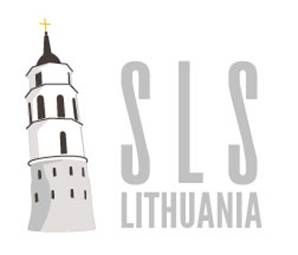 The global organization “Summer Literary Seminars (SLS)” is coming to Lithuania this summer!
The global organization “Summer Literary Seminars (SLS)” is coming to Lithuania this summer!
SLS Lithuania 2011 will take place in Vilnius, a welcoming European capital with a rich and diverse linguistic and literary heritage. The city has produced, or been haven and home to, some of the major figures of Lithuanian, Slavic, and Yiddish literature.
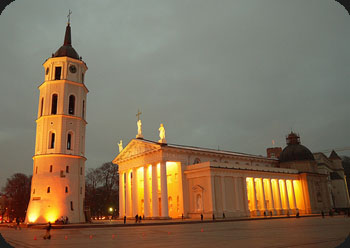 Vilnius is the perfect backdrop for a literary seminar. As a cultural crossroads over the centuries it has a rich and multi-layered past, which is reflected in the city’s varied architecture and intriguing residents. More importantly for SLS, Vilnius is not a city-museum but a city with a bright future and a rich, if at times troubled, past. From a purely practical vantage point, it's compact and walkable, and it offers all of the conveniences of a global city, albeit with its own idiosyncratic twists. An inspiration for any artist.
Vilnius is the perfect backdrop for a literary seminar. As a cultural crossroads over the centuries it has a rich and multi-layered past, which is reflected in the city’s varied architecture and intriguing residents. More importantly for SLS, Vilnius is not a city-museum but a city with a bright future and a rich, if at times troubled, past. From a purely practical vantage point, it's compact and walkable, and it offers all of the conveniences of a global city, albeit with its own idiosyncratic twists. An inspiration for any artist.
In addition to intensive daytime workshops taught by leading North American writers, participants in this unique two-week seminar will get a creative charge from the engagement with this refreshing and vibrant cultural milieu.
SLS offers much more than a mere change of scenery. Participants and faculty spend more time together outside of the classroom than in most summer literary programs.
In Lithuania, participants will also get to meet and socialize with fringe and mainstream artists from a different culture. And they get first-hand exposure to a lifestyle in flux -- one melding the absurdities of the Soviet past, the contradictions of the (East) European present, and the strivings of a feisty, innovative little land on the coast of the Baltic Sea.
Also, for its edition, SLS Lithuania will join in celebrations marking the centenary of the birth of the poet and 1980 Nobel laureate Czeslaw Milosz, who lived and studied in Vilnius before World War Two. He eventually settled in the United States and lectured at U.C. Berkeley for many years. SLS has invited faculty who were friends of this giant of twentieth century literature during his American years to join us in Vilnius.
In partnership with the Litvak Studies Institute, SLS will reprise the fascinating ‘Jewish Lithuania’ stream. The program is an intensive two-week exploration of Vilnius's (or if you prefer, Vilne's) rich Jewish past.
Summers are short in this corner of Northern Europe, which is why street life in Vilnius is lived to the hilt in August, when the days are long and the nights are short. Outdoor cafes, cozy courtyard bistros and cool cellar taprooms abound in Old Town -- prices are dramatically lower than in the big tourism hubs. And there are more winding streets, cobblestones, archways, bell towers, bridges, spires, steeples, and leafy parks with ancient oaks in Vilnius than you can aim a camera at. Come join us for the experience of a lifetime, a literary journey like no other.
Please feel free to direct any questions you may have to: info@litvakstudiesinstitute.org.
Seminars
Morning Seminars
Fiction – Joseph Kertes
Poetry – Edward Hirsch
Mixed Genre – Robin Hemley
Poetry & Translation – Kerry Shawn Keys
Afternoon Seminars
Fiction – Josip Novakovich
Poetry – Rebecca Seiferle
Laimis Briedis – “Vilnius: City of Strangers” Walking Tour
Jewish Lithuania:Litvak Experiences Option
SLS Lithuania June 31 - August 13, 2011
Click here for more information on SLS Lithuania
- Bookmark :
- Digg
- del.icio.us
- Stumbleupon
- Redit it
DnB NORD allows criminals to use the bank
- Posted by - (1) Comment
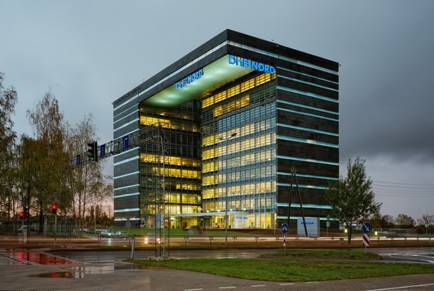
A new research study notes that only a small number of banks are willing to knowingly process what the industry calls "high-risk" transactions. In fact, just three banks, Azerigazbank in Azerbaijan, DnB NORD in Latvia and St.Kitts-Nevis-Anguilla National Bank in the Caribbean, provided the payment servicing for over 95 percent of the spam-advertised goods in the study. Norwegian DnB Nor owns the subsidiary DnB NORD bank in the Baltic States.
“Want to stop junk email? Block payments to spammers,” a new study tells. Researchers who have examined spam supply chains, find cutting off payments is the most effective way to stop influx of nuisance emails
Every day, people buy goods via automatic generated junk mails that offer cheap viagra pills, copies of art works, software, fashion clothing, medicine, fake handbags and everything else of illegal goods that can be obtained via the Internet. And people are buying lots of illegal and pirated goods, through criminal systems that have become a billion dollar industry.
In a new report by 15 scientists at Berkeley, San Diego International Computer Science Institute and the Budapest University of Technology and Economics appointed three banks as the main culprits.
The research notes that only a small number of banks are willing to knowingly process what the industry calls "high-risk" transactions. In fact, just three banks, Azerigazbank in Azerbaijan, DnB NORD in Latvia and St.Kitts-Nevis-Anguilla National Bank in the Caribbean, provided the payment servicing for over 95 percent of the spam-advertised goods in the study. Norwegian DnB Nor owns the subsidiary DnB NORD bank in the Baltic States.
The researchers even went as far as to purchase spam-advertised goods in order to find out who the payment processors are. Finding a way to stifle the operations of a payment processor would be a much more disruptive action than domain blocking, the researchers note.
"It is the banking component of the spam value chain that is both the least studied and, we believe, the most critical," researchers state in the paper. "Without an effective mechanism to transfer consumer payments, it would be difficult to finance the rest of the spam ecosystem."
"The replacement cost for new banks is high, both in setup fees and more importantly in time and overhead," the paper states. "Acquiring a legitimate merchant account directly with a bank requires coordination with the bank, with the card association, with a payment processor and typically involves a great deal of due diligence and delay.
The onus to stop payments would ultimately be on Western banks, the researchers conclude.
"If the U.S. issuing banks (i.e. banks that provide credit cards to U.S. consumers) refused to settle certain transactions (e.g., card-not-present transactions for a subset of Merchant Category Codes) with the banks identified as supporting spam-advertised goods, then the underlying enterprise would be dramatically demonetized. Furthermore, it appears plausible that such a "financial blacklist" could be updated very quickly (driven by modest numbers of undercover buys, as in our study) and far more rapidly than the turn-around time to acquire new banking resources - a rare asymmetry favouring the anti-spam community."
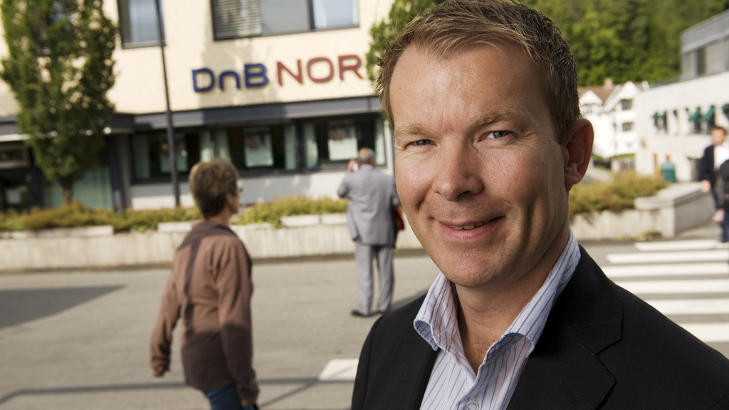
Information Director of DnB Nor, Thomas Midteide, admits to Norwegian DAGBLADET that DnB NORD has had problems with spam-customers. Photo: DNB NOR
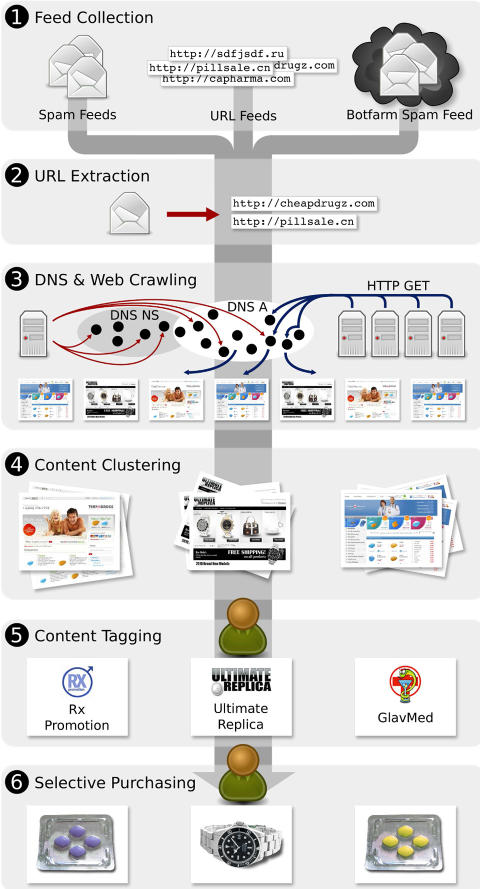
In the work, the scientists followed the money, receiving spam from around theworld, making over 100 purchases for three months and found that three banks account for 95 percent of all waste transactions.
Illustration from the report.
Has thrown out spam customer
- This is as far as I know a group of students who completed about 70 transactions, and so on which banks were clearing bank. One of the banks that came up was thus DnB Nord, "says information officer of DnB Nor in Oslo, Thomas Midteide, to Dagbladet.
He admits that DnB NORD has had problems with spam-customers.
- We took over the Latvian bank in the New Year. They previously had a customer who had his share of the cash flow from the spam-related activities. This customer was terminated before we took over the bank, and is therefore not a customer of the bank anymore, "Midteide. He says that the exchange amount that went through this account was not big.
- Spam is a big problem for everyone using electronic channels, and we in the banks must also do our part to prevent this type of activity, "says Midteide to the newspaper.
China, India, USA and New Zealand
All booking software and 85 percent of medication orders used the correct Visa category code that identifies what is sold. The reason for this is that they can get huge fines from Visa when they put the wrong code to hide the fact that they are selling risk goods.
The sale was completed by 13 providers in four countries: USA, India, China and New Zealand. Most of the drugs came from India, most herbal products came from the U.S., probably because of weak regulation of this market in the U.S.
In order to stop selling fake goods researchers suggest that the attack on the infrastructure for payment. The options are few and switching infrastructure costs a lot. They suggest that the U.S. stock rules that make it illegal to carry out transactions for known sellers. They write that it is not working very helpful to keep track of suppliers of illegal goods.
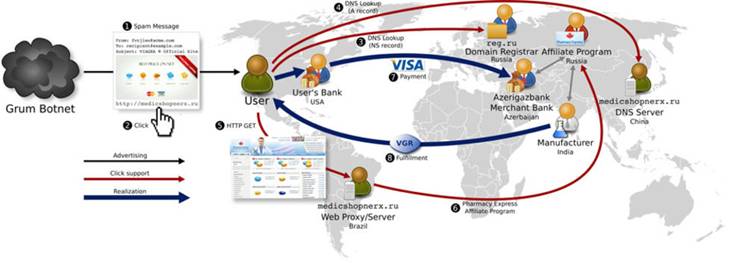
The infrastructure of a single chain URLs in the spam world.
Illustration from the report.
- Bookmark :
- Digg
- del.icio.us
- Stumbleupon
- Redit it
Can we trust Lithuanian media?
- Posted by - (5) Comment

"Lithuania's corrupt media hurts everyone," says a 2007 report from the U.S. Embassy in Vilnius, published by WikiLeaks.
Norwegian Aftenposten tells this week that Lithuania, Bulgaria, Mexico and the Philippines are among the countries where one most easily can buy journalists and editors.
The newspaper refers to a four year old report from the U.S. Embassy in Vilnius, published by WikiLeaks. The report presents a very discouraging picture of the way the Lithuanian media works, and gives concrete examples of how politicians and businesses must pay local media to avoid negative publicity.
Click here to read the WikiLeaks document.
Worse after the financial crisis
"You must buy the right not to be attacked," Vilius Kavaliauskas, long-time journalist and former advisor to the Lithuanian Prime Minister is quoted saying to the Embassy people.
Kavaliauskas, who now works as a freelance journalist, tells Aftenposten that the financial crisis has exacerbated the ethical standards among media in Lithuania.
"It has not become any better since 2007. Many editors and journalists sell and monopolize news and opinions, and there are always questionable political alliances between the media and people in power. Two years ago the media in Lithuania lost its tax exemption. Now they pay 21 percent tax as all other businesses. This has increased the culture of corruption, and is a disaster for our country, "he says.
According to Kavaliauskas the new press laws that were introduced in the middle of the 1990s were inspired by the laws of the Scandinavian countries. "We were on good way, but now we see a total setback," he says.
Pfizer declined 'deal' with Respublika
The embassy document from 2007, which is titled "Lithuania's corrupt media harm everyone, including U.S. industry," says the local director of Pfizer's office in Vilnius, explaining in detail how he was contacted by the owner of the large newspaper Respublika, which offered to "kill" the pharmaceutical manufacturer's competitors in Lithuania.
The price would be one million litas ($ 400,000), and the director was given two weeks' time to respond, it says. When the two weeks had passed, he was again contacted by the newspaper's advertising people, but the director rejected the collaboration.
Shortly after, Respublika started to publish a series of negative articles about Pfizer, which among other things, claimed that several had died from using Viagra, that Pfizer was charging too much for their products, taking advantage of poor hospital patients and sick people.
Discontent over the price difference
The WikiLeaks document published by Aftenposten, also tells about a representative of the Lithuania's Labour Party who claimed that placing a positive article about him in the leading newspaper Lietuvos Rytas would cost 25,000 litas ($ 10,000), whereas a representative of the Social Democrat party would have to pay only 5,000 litas ($ 2,000).
"He was not complaining about paying for an article - he accepted that as common practice. He was complaining that his party had to pay more than another party," is the laconic comment in the embassy message.
Worst in Mexico and the Philippines
-Corruption in the media is common in Eastern Europe, Asia, Africa and Latin America, but absolute worst is now in Mexico and the Philippines, "says Eva Stabell, director of the International Federation of Journalists (IFJ) and responsible for the Norwegian Journalist Team's international work to Aftenposten.
"In these two countries there is a total corruption culture among journalists, incorporated as a part of their payments," she says.
In both countries have a large number of journalists have been killed in recent years.
"Many journalists are on the payroll of the mafia, " she says.
- Bookmark :
- Digg
- del.icio.us
- Stumbleupon
- Redit it

Lithuania was very pleased and grateful when Norwegian Telecom installed a satellite telephone station in the Lithuanian parliament, making it possible for Landsbergis to stay in touch with the world when the Soviets re-invaded Lithuania in 1991. But the country did little to hold on to Telenor and other Western investors. "We don’t need you," said former president Brazauskas.
Aage Myhre, Editor-in-Chief
To attract more foreign investors is often held up as a good way for Lithuania to follow – in order to achieve a more viable development, raise living standards and develop a more democratic, less corrupt society.
I began my personal efforts to assist Lithuania exactly 21 years ago, when Parliament President Vytautas Landsbergis announced that he would come to Oslo, on his first so-called official visit to a western country. I and a handful of others were ahead of his visit contacted by a presidential advisor and asked to put the best possible conditions for Landsbergis' visit to my home country Norway. That was how my long relationship to and with Lithuania started...
Landsbergis’ visit to Oslo became a great success and our group was therefore soon thereafter invited to visit Lithuania.
One thing that we put the most of emphasis on, already when Landsbergis was in Oslo the summer of 1990 and during our group’s initial visits to Lithuania, was to invite serious Western investors here.
Already during my very first visit here, in November 1990, we brought with us a representative of the governmental Norwegian oil company STATOIL, introducing the company to the Baltic States.
Just two years later STATOIL began developing the now well-known network of petrol stations across the Baltics and Poland. Our main contribution to STATOIL that time was to introduce them to representatives of governments, organizations and individuals we thought might be of help. The last substantial roles I had for the company was as an architect and facilitator of their offices here in Vilnius in the early 1990's, and to advise them when they later met on corruption and other problems.
During my first visit to Vilnius I also negotiated a contract with Lithuania's communications minister, based on an agreement I had with the Norwegian Telecommunications Administration to provide a satellite telephone station as a gift to Lithuania, and to install it in the parliament here, Parliament President Vytautas Landsbergis had asked our group of ' Lithuania-helpers' about this support when he was on a visit to Norway the summer of 1990.
Not long after this satellite telephone system turned out as very useful when Soviet troops re-invaded the Baltic States and cut all other calling options with foreign countries.
As a 'thank you for your help' the Norwegian Telecom was offered to create the first network for mobile phones here, but they rejected because they thought the market here was too small. They were also very tired of the treatments they were given by local bureaucrats.
I remember that this deeply disappointed me and Telecom's export director, who I worked closely with for the above mentioned satellite station in 1990-1991, and later on when we both tried to position the Norwegian company in the Baltics.
During the years that followed, I invited and tried to set stage for a number of Western investors. Some of them accepted, and some are still in full operation and business here today, very successfully!
What I quickly discovered, already two decades ago, was the importance of having a good personal contact with representatives of those companies, speaking ‘their language’ and to help them with many different problems and challenges in this misguided country where Soviet laws, structures and modes of action was still largely in force, and corruption a very widespread phenomenon.
I also understood that it was very important to offer ‘concepts’ not just ‘projects’ and investment objects to new investors.
Unfortunately, I seldom saw true understanding and interest from the Lithuanian authorities during those years. Even the largest and most serious firms were most often met with a shrug. "What's in it for me personally," was the question that was often presented when we contacted representatives of local authorities and businesses.
I will never forget when I in 1995 had lunch with Chicago’s largest builder, in the Neringa Restaurant here in Gedimino Avenue, a Lithuanian-American who had returned to Lithuania four years earlier, full of optimism and dreams of a restored home country. The day he left he told me: “Aage, let me tell you frankly that they have all cheated me. I invested into business, production, a hotel and more. But they all cheated me – from the highest of politicians to the simplest of workers. I am sick and tired of seeing how these people have ruined my homeland, and I’m now leaving it all behind. I will never again put foot on the soil of the country I dreamed of and supported for all my lifetime.”
I will also never forget that Lithuania's president and leader through much of the 1980s and 1990s, Algirdas Brazauskas, by then made it clear that Lithuania did not need foreign investments.
"We have enough money in this country, among our own investors and companies. We simply need no foreigners here," he said…
One could perhaps have thought that today's leaders would had learned, but the fact is that neither expatriates living here nor people within the country’s own diasporas around the world are much asked for help, advice or contributions. And when the authorities ask, they often ask the wrong people and institutions.
Let me, finally, also share with you a passage from Steven Levy’s book “How Google Thinks, Works and Shapes Our Lives”.
President Brazauskas' attitude and the following description explains a lot about why both and Lithuania are still living in a European backwater. Another sad example of how little the leaders of these two countries understood by then – and very often also today...
Here’s what Steven Levy writes:
“Google also made a priority to build centers overseas. Not long after she found the location in Atlanta, Cathy Gordon went to Europe, where Google wanted to build a giant data center similar to the one in the United States. Google had studied the laws and business practices of every country and narrowed the field to a few that might be able to provide the power and water required, as well as a friendly governmental hand. Some of the proposed locations were predictable – Switzerland, Belgium, France – but a couple were not.
One of those were Latvia, which Gordon had never visited before. The Google team flew into a ramshackle little airport and met the economic development committee, a cadre of what seemed to be stereotypical Soviet bureaucrats. Their host escorted them to the potential data centre site, an abandoned Soviet minibus factory. The building was cavernous and gloomy. In the centre of the building was a giant pit, and Gordon could not help but wonder whether any bodies were quietly decomposing in the stew. The group went to the area where the power facilities were located, and it looked to Gordon like they were on an old horror movie set, a ‘Gulag Archipelago’ version of Dr. Frankenstein’s lab. One of the hosts leaned over and spoke in a confidential whisper, heavy with Slavic accent. “Don’t go to near those things,” he said. “Basically we don’t know if they could kill you.”
“We eventually ended up doing a deal in Belgium,” says Gordon.
- Bookmark :
- Digg
- del.icio.us
- Stumbleupon
- Redit it
- Posted by - (7) Comment
Lithuania's economic crisis leads to crime and social disparities
Article 1 of 3

A report published by Associate Professor Aurelijus Gutauskas at Mykolas Romeris University's Law Faculty gives a very interesting insight into how the economic downturn has led to increased social disparities, crime, fraud and widespread shadow economy in Lithuania.
These are some of his findings:
The economic decline will have far-reaching negative effects on the most vulnerable groups in Lithuania unless the government takes additional measures
As in many countries worldwide, the economic downturn in Lithuania has had an adverse impact on national, social, and economic development. The economic decline will have far-reaching negative effects on the most vulnerable groups in Lithuania unless the government takes additional measures to promote employment and provide social protection.
The major negative social consequences of the economic decline in Lithuania are job losses and a decrease in income. These result in rising long-term unemployment, growing social exclusion, and an increase in emigration and the shadow economy.
Criminal offences against the financial system have increased by 47%
The statistical data analysis has shown that during the economic decline the crime rate increased while unemployment rose and household income decreased. Since 2008, the number of recorded criminal offences has been increasing by 6 to 7 per cent annually and reached 83,200 in 2009.
In 2009, the number of recorded criminal offences against the financial system increased by 47 %, and criminal offences related to the possession of narcotic or psychotropic substances increased by 19 %.
The production of counterfeit currency and securities increased by 258.6 % (from 237 to 613 cases) and cases of fraud grew by 59.1 % (from 915 to 1456 cases). Furthermore, the unlawful production of alcoholic beverages and the number of crimes committed by intoxicated persons nearly doubled in 2009. Based on Lithuanian and foreign experience, an increase in crime is expected to continue until 2012–2013 as restraints on economic crimes take longer to implement and are related to a rise in the standard of living in the country.
Lithuania's shadow economy will account for more than 20% of the GDP by 2015
The economic downturn has resulted in an increasing number of businesses experiencing financial difficulties, and some of them turn to the shadow economy as a means of salvation. This is particularly the case in the area of labor relations and in regard to failure to pay taxes (such as income and social insurance taxes). According to official Lithuanian statistics from 2004 and 2008, the shadow economy in Lithuania accounted for about 15 per cent of the GDP. The declining profitability of business entities, the rise in tax rates, and the worsening macroeconomic environment may increase the scope of the shadow economy to 20-22% by 2015.
Younger criminals are taking over the organized crime
The most significant trend within the Lithuanian organized crime community is the shift in power between the older and younger generations. The younger generations are gaining ground and seeking to increase their influence at the expense of older members. Lithuanian OCGs (organized criminal groups) are also aiming to become more interregional within Lithuania.
Smuggling and distribution of drugs and excise good are the most important means for OCGs to gain power. These groups have created an infrastructure in the drug trade and developed channels of supply, as well as networks of distributors, in almost all regions of Lithuania. Even group members who are in prison remain in the drug trade and control it. Smuggling is a strong factor encouraging the creation of new OCGs that specialize in this function.
Free movement of people and commodities inside the EU facilitates the shipment of illegal cargoes, and flawed external border security allows smuggling. The increasing trade in used vehicles in Lithuania has become a factor in the infrastructure for handling stolen property, with vehicles stolen in Western countries being exchanged for drugs. This made it possible for Lithuanian OCGs to play an influential, international role in heroin smuggling from the East to the West. The proceeds of crime are laundered through businesses in the financial and construction sectors.
In Russia in 2009 and 2010, Lithuanian OCGs used opportunities related to the acquisition of excise goods to engage in smuggling goods into the West, and then into the Netherlands. The goods smuggled included cocaine, hashish, cannabis, amphetamines, methamphetamines and ecstasy (MDMA), heroin (in the region of Kaliningrad), stolen vehicles.

Lithuanian criminal groups now operate all over Europe
Article 2 of 3

The EU's criminal intelligence agency EUROPOL has in its Organized Crime Threat Assessment for 2011 defined Estonia, Latvia, Lithuania and the Russian Federation exclave of Kaliningrad as the northeast criminal hub, singling out the prevalence of crime groups in Lithuania. Europol Assesses Baltic Organized Crime Hub | News | ERR
A report published by Associate Professor Aurelijus Gutauskas at Mykolas Romeris University's Law Faculty gives a very interesting insight into how the economic downturn has led to increased social disparities, crime, fraud and widespread shadow economy in Lithuania.
VilNews is presenting some of Professor Gutauskas' findings over three issues. This is our article number two:
23 active organized criminal groups (OCGs) in Lithuania
In 2010, there were 23 active organized criminal groups (OCGs) in Lithuania. Over the last two years, the number has remained much the same. Higher level OCGs are characterized by long-term activity or are recomposed from the members of broken or dismantled OCGs. The leadership is constantly renewed by young, new members or criminals who have already served prison sentences.
The geographical location of Lithuania encourages the international activity of OCGs. Lithuania is located at the crossroads of illicit commodities traffic in both internal and external directions. The locality of OCGs preconditioned their specialization when it came to control of regions of the external European Union border. Some of them use their influence at the Belarusian border, others at the Russian border.
Smuggling and distribution of drugs and excise good are the most important means for OCGs
Smuggling and distribution of drugs and excise good are the most important means for OCGs to gain power. These groups have created an infrastructure in the drug trade and developed channels of supply, as well as networks of distributors, in almost all regions of Lithuania. Even group members who are in prison remain in the drug trade and control it. Smuggling is a strong factor encouraging the creation of new OCGs that specialize in this function.
Human trafficking
Human trafficking has taken a new form as some victims agree to travel to countries with higher standards of living and engage in voluntary prostitution. The women's social vulnerability (unemployment, absence of income) and absence of other information results in their allowing others to take half of their income. Human trafficking is organized and committed not only by OCGs but also, in some regions of Lithuania, by individuals with no direct connections with OCGs.
Human trafficking involves recruiting people (by deception or telling the truth), organizing transportation (by finding ways to forge documents and arrange transport), and searching for locations in which to sell and receive profit. Payment is sometimes extracted from the person's earnings. Victims of human trafficking are usually women aged 18 to 24. They are recruited through modeling agencies, radio shows, online dating, social networks such as Facebook and other websites, and often voluntarily leave their home countries. Cases are known in which women are offered legal jobs (as waitresses and dancers), but once transported abroad they are forced to provide sexual services. Violence is also often used to make them work and to intimidate others. Search and recruitment is conducted by low-level members of the OCGs. Women are not only recruited by procurers but also by working prostitutes who receive rewards of up to 600 Euros for a new woman.
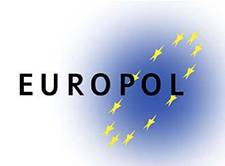
The European police service Europol has recently wound up an investigation into child pornography which lasted two years. Raids were made on houses in 20 countries. A total of 221 suspected pedophiles were discovered and 115 of them were arrested. Some of the suspects had jobs working with children. Victims of various nationalities were identified in the course of the investigation. The youngest was five.
Increased fraud, corruption and money laundering
Article 3 of 3
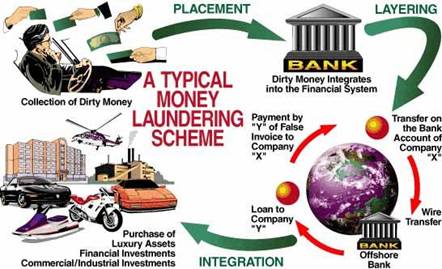
A report published by Associate Professor Aurelijus Gutauskas at Mykolas Romeris University's Law Faculty gives a very interesting insight into how the economic downturn has led to increased social disparities, crime, fraud and widespread shadow economy in Lithuania.
VilNews is presenting some of Professor Gutauskas' findings over three issues. This is our article number three:
Fraud
In 2009, 4229 cases of fraud were registered by law enforcement agencies, and 2494 more were registered between January and July 2010. In comparison with 2008 (when there were 2773 cases of fraud), there is an obvious increase in the commission of this kind of crime.
The economic crisis has affected many fields of business. Payments among the participants in an economy in disarray and a massive increase in mutual debts raise the probability of an increase in fraud crimes. Business difficulties stimulate the rise of new ways of perpetrating fraud, manipulation, shady financial transactions, and other forms of misappropriation. An increase of insurance fraud is also predicted. Companies that are going bankrupt, receiving no bank loans, and short of liquid assets will easily be attracted by offers of financial assistance or investment and will not investigate the source of the money. Analysis of investigations shows a trend of OCGs working to create favorable environment for acquiring legal businesses. By taking over insolvent companies and using them to launder the proceeds of crime, criminal groups would more easily be able to control a legal business. There has also been an increase in the number of fraud cases among legal entities. Companies are established or purchased in order to commit fraud, and commodities are purchased on the grounds of consignation. There are also cases of fraud in the recovery of VAT. Companies of this kind later go bankrupt or are illicitly sold to other persons, and further activity is undertaken. The persons who acquire them are usually antisocial, and trade is conducted using lost or stolen identity documents.
Corruption
Many law enforcement officers, prosecutors, and lawyers, at all levels and ranks, particularly those who specialize in tax cases, become corrupt. They set out to receive unlawful rewards from persons suspected of crimes against the financial system, who can avoid prosecution by paying bribes. If the bribe fails – that is to say, if the pre-trial investigation is not dismissed or the criminal act is not downgraded to a milder article of the criminal code – these persons make up charges and pay officers to intimidate or financially weaken their business competitors.
Those who participate in corruption in public tendering are persons who in the administrative field (officials of ministries, budgetary institutions, and municipalities), employees of public institutions, and managers of private companies or companies run by the state and municipalities. Aspects of corruption are noticed in all fields and stages of public tendering. Corrupt activity manifests itself most in the organization of public tendering regarding constructions, refurbishment, and information technologies.
Different corruption mechanisms are employed at each stage of public tendering. The initial stage includes one type of fraud. Representatives of companies participating in this procedure come to an informal agreement on a winner in a certain town, region, or ministry, and fix the price for services, commodities, or work. Agreements of this kind maintain high prices and stable income (the company knows how many tenders it will win each year). They also exclude possible competitors.
Money laundering
In order to launder money, foreign companies transfer their money to the accounts of fake foreign or Lithuanian companies that are usually established in Lithuanian banks by foreign citizens. Money is then transferred from one country to another through Lithuania financial institutions using the accounts of these fake companies. The proceeds of crime acquired in Lithuania may be transferred to foreign states, or the proceeds of crime in foreign countries may be transferred to Lithuania.
Lithuanian companies transfer money to the fake company or non-profit (usually fitness clubs), and the money is cashed immediately after it has been transferred. After the money has been cashed, fake accounts are opened and managed by antisocial citizens of both Lithuania and foreign countries who often have connections with criminal groups.
It is assumed that the major reason for transferring assets to Lithuania is to conceal the illegal origin of the assets. Nevertheless, cases have been discovered in which Lithuanian nationals used accounts in foreign countries while engaging in similar criminal activity.
Lithuanian companies increasingly use companies registered in foreign countries and foreign nationals to transfer money to the accounts of fake companies or offshore companies in foreign banks. More cases occur in which money is cashed in neighboring countries and in which the citizens of that particular country are involved.
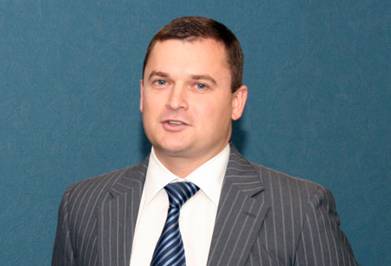
Former director of Lietuvos Pastas (Lithuanian Post) and Swedbank (Hanza) Leasing, Andrius Urbonas, was last year arrested for fraud. Urbonas was accused of having used his high position and connections in banking institutions to make loans to clients whose applications for loans were previously rejected. Authorities claim that he laundered money through the scheme. He denies the charges. A criminal case against him and other directors from Swedbank Leasing started in Vilnius District Court last week.
THE REPORT:
Economic Crisis and Organized Crime in Lithuania
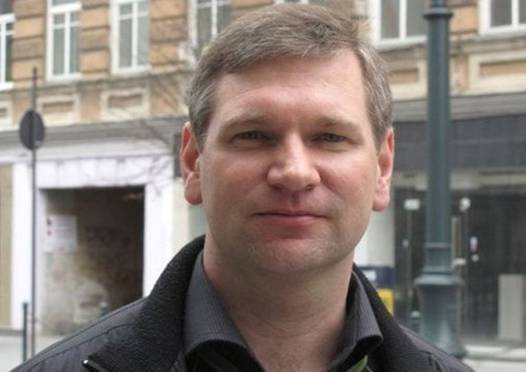
Associate Professor Aurelijus Gutauskas
Mykolas Romeris University
Law Faculty
Criminal Law and Criminology Department
Head of the Department
Contents
1 Economic and Social Impact of the Financial Crisis
1.1 Increase in the Crime Rate
1.2 Growth of the Shadow Economy
2 Trends within Organized Crime in Lithuania
2.2 Organized Crime Groups Active in Lithuania
2.3 Description of Criminal Acts
2.3.2 Cigarette and Alcohol Smuggling
2.3.4 Human Trafficking and Exploitation
2.3.6 Corruption of Public Officials and Institutions
1 Economic and Social Impact of the Financial Crisis
Since the start of the new millennium, the Baltic region has enjoyed one of the highest growth rates in the world. This positive development was interrupted by the financial crisis and the recession that followed.
As in many countries worldwide, the economic downturn in Lithuania has had an adverse impact on national, social, and economic development. The economic decline will have far-reaching negative effects on the most vulnerable groups in Lithuania unless the government takes additional measures to promote employment and provide social protection. In order to mitigate the possible negative social consequences of the decline, an attempt should be made to assess its impact on the country's socio-economic development (development of the population, income indicators of households, etc.) as well as to recommend measures to address any problems identified.
The major negative social consequences of the economic decline in Lithuania are job losses and a decrease in income. These result in rising long-term unemployment, growing social exclusion, and an increase in emigration and the shadow economy. In the long run, all of these increase poverty and reduce the quality of the labor force. For instance, both diminished skills and reduced work motivation weaken the recovery potential of the national economy.
The economic crisis has had a major negative impact on the Lithuanian labor market.[1] In the first quarter of 2009, the national unemployment rate more than doubled compared to the first quarter of 2008. If these trends continue, Lithuania will see a dramatic increase in the number of long-term unemployed (in 2010, they constituted 30 per cent of the unemployed, or 78,000 persons). High long-term unemployment is likely to persist even after the anticipated recovery of the national economy between 2012 and 2015 as most unemployed people are less competitive in the market due to their weaker or diminished skills after a long period of unemployment.
Rising unemployment also worsens the financial situations of households, as indicated by the ever-increasing number of persons receiving social benefits in Lithuania. The assessment of changes in earnings and unemployment in Lithuania shows that household income will continue to decline in 2010, but will then start rising slightly due to the growing shadow economy, as a well as the slow economic recovery anticipated in 2011. However, income levels in 2015 will not even reach those of 2008. Decreasing household incomes may boost the absolute poverty rate as high as 13.2 per cent in 2010. This means that the income of 440,700 persons will be below the poverty line. The absolute poverty rate is not expected to return to the level of the year 2008 (i.e. 4.8 per cent) before 2015.[2]
The deteriorating macroeconomic situation in the country boosts emigration from Lithuania.[3] Bearing in mind that the Lithuanian economy is expected to recover only in 2011–2012, emigration is likely to result in that Lithuania may lose another 100,000 to 150,000 residents by 2015.[4] In the long term, higher rates of emigration are associated with serious problems such as population decline, brain drain, and demographic ageing, all of which markedly weaken the growth potential of the national economy and slow down improvement in the standard of living.
1.1 Increase in the Crime Rate
The statistical data analysis has shown that during the economic decline the crime rate increased while unemployment rose and household income decreased.
Since 2008, the number of recorded criminal offences has been increasing by 6 to 7 per cent annually and reached 83,200 in 2009. Crimes accounted for about 90 per cent of all recorded offences. About 5 to 6 per cent of the crimes were serious or grave. In 2009 two-thirds of the criminal offences recorded were property-related, an increase of 6 per cent. Three-fourths of all property-related criminal offences recorded were thefts. In 2009, 40,000 thefts were recorded, which is 3 per cent more than in 2008.
In 2009, the number of recorded criminal offences against the financial system increased by 47 per cent, and criminal offences related to the possession of narcotic or psychotropic substances increased by 19 per cent.[5]
The production of counterfeit currency and securities increased by 258.6 per cent (from 237 to 613 cases) and cases of fraud grew by 59.1 per cent (from 915 to 1456 cases). Furthermore, the unlawful production of alcoholic beverages and the number of crimes committed by intoxicated persons nearly doubled in 2009. Based on Lithuanian and foreign experience, an increase in crime is expected to continue until 2012–2013 as restraints on economic crimes take longer to implement and are related to a rise in the standard of living in the country.[6]
1.2 Growth of the Shadow Economy
The economic downturn has resulted in an increasing number of businesses experiencing financial difficulties, and some of them turn to the shadow economy as a means of salvation. This is particularly the case in the area of labor relations and in regard to failure to pay taxes (such as income and social insurance taxes). According to official Lithuanian statistics from 2004 and 2008, the shadow economy in Lithuania accounted for about 15 per cent of the GDP. The declining profitability of business entities, the rise in tax rates, and the worsening macroeconomic environment may increase the scope of the shadow economy to 20-22 per cent by 2015. It is important to note that shadow activities develop very fast, but eradicating them is a slow process.
The biggest part of the parallel economy is smuggling, closely followed by the unaccounted sale of goods and unreported remuneration[7]. In order to reduce the impact of the shadow economy, the government has decided to focus on extracting one billion litas from it, which represents roughly 5 per cent of total tax income, instead of increasing taxes or cutting social benefits and salaries of public servants.
The shadow economy not only has an adverse effect on the country's economy, but it also has negative social consequences such as an increase in social and economic differentiation, a rise of the level of corruption in the country, the reduction of social guaranties for individuals, poorly allocated resources across sectors, an unbalanced tax system and a slowdown of the country's economic growth.
2 Trends within Organized Crime in Lithuania
In 2010, there were 23 active organized criminal groups (OCGs) in Lithuania.[8] Over the last two years, the number has remained much the same. Higher level OCGs are characterized by long-term activity or are recomposed from the members of broken or dismantled OCGs. The leadership is constantly renewed by young, new members or criminals who have already served prison sentences.
The most significant trend within the Lithuanian organized crime community is the shift in power between the older and younger generations. The younger generations are gaining ground and seeking to increase their influence at the expense of older members. Lithuanian OCGs are also aiming to become more interregional within Lithuania.
The dominant OCGs expand their authority and influence lower-level OCGs in different regions. Some OCGs started to seek dominant positions when members of higher-level OCGs return from corrective institutions.
Due to the change in criminal leadership, internal and external OCGs experience conflict and dishonesty between accomplices in continuing criminal deals. Violent actions are taken by OCGs seeking to be dominant. Interregional OCGs support their followers during conflicts between local OCGs. Firearms are used in campaigns of influence or revenge. During assaults, people are kidnapped, harmed, or killed, and their property is destroyed.[9]
In some situations, organized crime groups decide to make deals instead of turning to violence. They sometimes share the market and specialize in different trades. There is a trend for weaker OCGs to join bigger groups and find a niche within the larger organization. This development seems to be increasingly common among OCGs with international connections.
In 2009 and during the first semester of 2010, crime indicators in Lithuania decreased. (paaiskinti teksta). However, there was an increase in crimes committed by OCGs. The number of criminal acts related to murder and attempted murder, possession of weapons and seizures of weapons, seizure of property, property extortion, destruction of property, drug distribution, and excise goods smuggling increased in the regions of activity of the most influential OCGs. The crimes committed by OCGs incorporated a high level of planning and the application of special means and measures.
Smuggling and distribution of drugs and excise good are the most important means for OCGs to gain power. These groups have created an infrastructure in the drug trade and developed channels of supply, as well as networks of distributors, in almost all regions of Lithuania. Even group members who are in prison remain in the drug trade and control it. Smuggling is a strong factor encouraging the creation of new OCGs that specialize in this function.
In certain regions of Lithuania, OCGs active only in the field of smuggling are dominant. The groups controlling international relations ensure provision of illicit commodities. Lower-level OCGs organize the distribution and/or implement smuggling. Competition for influence is more typical of the retail trade in drugs. Property seizure is also a criminal field in which OCGs have strong subgroups or new specialized groups. OCGs acting at the international level seize luxurious cars and watercraft, equipments of cargo shipments, agriculture, and buildings. Property is seized from trade points and residential premises in different ways. In 2009, there was a tendency to break into agencies where large amounts of money were kept or to organize armed raids on these agencies.[10]
During the crisis period, the number of crimes committed against the economy and, the financial system rose, along with other kinds of fraud. The disruption of economic activity by companies and the mutual debts held by those companies resulted in property extortion and abuse of authority. Businessmen controlled by OCGs or dependent on criminals became the target of property extortion due to their debts. Another reason for the profitability of property extortion was the rise in the number of persons engaged in the distribution of illicit commodities or smuggling. Managing financial resources gave Lithuanian and foreign OCGs a chance to invest in the business sector. However, some groups lost their influence during the economic crisis because they experienced a financial downturn and lost the power they had previously held by serving legal businesses.[11]
2.1 Transnational Links
The geographical location of Lithuania encourages the international activity of OCGs. Lithuania is located at the crossroads of illicit commodities traffic in both internal and external directions. The locality of OCGs preconditioned their specialization when it came to control of regions of the external European Union border. Some of them use their influence at the Belarusian border, others at the Russian border. Close international relations with neighboring countries are also typical of local OCGs like those at the internal EU borders with Latvia and Poland.
Free movement of people and commodities inside the EU facilitates the shipment of illegal cargoes, and flawed external border security allows smuggling. The increasing trade in used vehicles in Lithuania has become a factor in the infrastructure for handling stolen property, with vehicles stolen in Western countries being exchanged for drugs. This made it possible for Lithuanian OCGs to play an influential, international role in heroin smuggling from the East to the West. The proceeds of crime are laundered through businesses in the financial and construction sectors.
In Russia in 2009 and 2010, Lithuanian OCGs used opportunities related to the acquisition of excise goods to engage in smuggling goods into the West, and then into the Netherlands. The goods smuggled included cocaine, hashish, cannabis, amphetamines, methamphetamines and ecstasy (MDMA), heroin (in the region of Kaliningrad), stolen vehicles. The OCGs were also involved in the running of LBSs. Some members of Lithuanian OCGs have settled in Russia.
In Poland in 2009 and 2010, Lithuanian OCGs used opportunities related to the transport and handling of smuggled excise goods, the counterfeiting of cigarette products, the transport of smuggled drugs, vehicle theft, and the use of counterfeit electronic payment instruments.
In Germany in 2009 and during the first semester of 2010, Lithuanian OCGs handled and smuggled cigarettes, transported smuggled drugs, traded in heroin, managed the organization of prostitution networks, engaged in human trafficking, seized vehicles and other property, distributed forged identity documents and euros, transported illegal migrants, purchased property, ran LBSs, laundered money, and engaged in corruption. Some members of these groups are serving prison sentences in Germany.
In Latvia in 2009 and 2010, Lithuanian OCGs handled and smuggled cigarettes and pure alcohol, transported and handled heroin, cannabis, and ecstasy (MDMA), counterfeited euros, and committed various thefts from vehicles, pipelines, cargoes, and equipment and chemicals for agriculture. The groups also engaged in the legalization of stolen vehicles, the use of false electronic means of payment, fraud, the use of forged documents, and the running of LBSs.
In Estonia in 2009 and 2010, Lithuanian OCGs smuggled drugs and ran LBSs.
In Finland in 2009 and 2010, OCGs smuggled cocaine, amphetamines, and methamphetamines and seized property. Some OCG members are serving prison sentences in Finland.
In Sweden in 2009 and 2010, OCGs transported and handled cannabis, amphetamines, ecstasy (MDMA), stole cars and watercraft, and seized other property. Some members of Lithuanian OCGs have settled in Sweden.
Finally, in Denmark in 2009 and 2010, Lithuanian OCGs transported and handled smuggled methamphetamines, stole cars, watercraft and their parts, and seized property.
2.2 Organized Crime Groups Active in Lithuania
The main sources of information about the major OCGs and their activities are reports by the Organized Crime Investigation Division of the Criminal Police and by Lithuanian police units between 2009 and 2010. Some data also come from the State Border Guard and the Customs Criminal Services. The following OCGs have been identified.
2.2.1 Agurkas
The Agurkas group is one of the strongest OCGs in Lithuania, and the level of organized crime in the country depends on its activity. It also influences trends in organized crime committed by Lithuanians abroad.
Agurkas' criminal activities cover the production and distribution of narcotics, the smuggling of excise goods, theft of vehicles from residential premises, robbery, extortion of property, fraud, human trafficking, the organization of prostitution, currency counterfeiting, and document forgery. In 2009–2010 Agurkas members were also suspected of criminal acts related to illegal activities by companies, possession of criminal property, possession of weapons, disturbance of public order, resistance to and offenses against officers, unlawful deprivation of freedom, threats of killing, maiming, and attempted murder and sexual abuses.
The Agurkas group is active mainly in Russia, Latvia, and Estonia. The group also has some activities in Norway, the United Kingdom, Spain, and Ukraine. In the Baltic region, it poses a threat in Poland, Latvia, Estonia, Sweden, and Russia. In the EU, its activities affect Norway, the Netherlands, Germany, Belgium, the United Kingdom, Ireland, Spain, and eastern Ukraine. All of these countries are harmed by its drug distribution and property seizures. The grey economy in the West is stimulated by the handling of smuggled excise commodities and the handling of property seized in the East.
2.2.2 Beglikas
The criminal activities of the Beglikas group include drug and alcohol smuggling, money laundering, and other crimes against the financial system. Beglikas is present in Latvia, Estonia, and Russia as well as in Spain. Its power and influence may be related to the criminal authority of its leader, his connections, and his ability to entrench his influence and the effectiveness of countermeasures to drug smuggling in the Spain–Lithuania–Russia route. Its power is also increased by the economic activity of related LBSs. Society is harmed by drug distribution. The increasing economic power of the OCG also poses a threat.
2.2.3 Šmikiniai
The criminal activities of the Šmikiniai group include the smuggling and distribution of drugs, smuggling and distribution of excise commodities, robbery, theft of luxury vehicles, theft from vehicles, extortion of property, handling of stolen property, distribution of counterfeit money, organization of prostitution, possession of weapons, destruction of or damage to property, bodily injuries, and money laundering. The Šmikiniai group is present in Latvia, Estonia, Finland, Sweden, Germany, Spain, and Russia as well as in Switzerland and Iceland. In the Baltic region Illegal commodities are transported through Latvia and Estonia. Drugs are distributed and property seized in the region of Scandinavia. The group is a threat in many north-western EU countries and in Russia because of cocaine smuggling from South America. The societies of these countries suffer harm due to drug distribution and money laundering. Victims of human trafficking from Lithuania and the East may be exploited in prostitution networks.
2.2.4 Žemaičiai
The criminal activities of the Þemaièiai group include drug production, smuggling and distribution; the smuggling and distribution of counterfeit money; extortion of property; fraud; robbery; theft including the theft of vehicles, motorcycles and water motorcycles; handling stolen property; crimes against the economy and the financial system; money laundering; violating public order; possession of weapons; destruction and damage of property; illegal deprivation of freedom; bodily injury, and murder. The Þemaièiai group is present in Latvia, Estonia, Germany, and Russia and also in many other EU countries such as Belgium, the Netherlands, the United Kingdom, Ireland, France, Bulgaria, Italy, and Spain. Drug smuggling is facilitated by the free movement of people and commodities within the EU and by weak external border security. This OCG uses LBSs in the fields of haulage, agriculture, and finance for criminal purposes. It uses EU financial support to strengthen its powers. Thanks to communication technologies, distant members can maintain constant contact.
2.2.5 Miliai
The criminal activities of the Miliai group include drug smuggling and distribution, the smuggling of excise commodities, property extortion, crimes against the economy, and money laundering. Miliai is present in Sweden and Russia as well as in Norway, Belgium, the Netherlands, the United Kingdom, Italy, Belarus, and Ukraine.
2.2.6 Buduliai
The criminal activities of the Buduliai group include drug smuggling and distribution as well as cigarette smuggling. It is present in some regions of Latvia that play an important role in drug smuggling, and in Norway where it connects with immigrants from Lithuania. Latvia suffers harm from the activity of Buduliai, and the OCG also encourages trade in drugs and cigarettes smuggling in Norway.
2.2.7 Švinius
The criminal activities of the Švinius include cigarette smuggling, money laundering, crimes against the economy, fraud, property extortion, robbery, bodily harm and possession of weapons. This group is present in Latvia, Germany, and Russia as well as in the United Kingdom and Belarus where the OCG runs LBSs, operates in the field of business construction, and makes use of corruption.
2.3 Description of Criminal Acts
Information in this section, as in the previous section, mostly comes from the Organized Crime Investigation Division of the Criminal Police and regular police units.
2.3.1 Drug Trafficking
The drug market trends in the Baltic States are similar, and the problem is increasing. For instance, in 2010, 5.5 kg of heroin was found in a hidden compartment of a truck at the Latvian–Lithuanian border. This was the largest quantity of heroin ever seized in the country.[12]
In 2009 heroin was the most popular intravenous drug in Lithuania and the demand which rose for it three years ago has remained. With reference to the results of work of law enforcement agencies in 2009 heroin prevailed among drugs withdrawn in doses in Lithuania and the data on detentions indicates that heroin replaced the previously used concentrate of poppies.
In 2009 3.7 kg and 853 ml of heroin were detained in Lithuania. In 2010, 1st half-year, 5.5 kg of a narcotic substance, namely, heroin, were found in a hidden compartment in a truck at the Latvian and Lithuanian border. This is the largest quantity of heroin detained in Lithuania. Its value on the black market would amount to one million Litas (i.e. 289620 EUR).
According to the intelligence, the wholesale price of 1g of heroin in Lithuania fluctuates from 90 LTL (26 EUR) to 160 LTL (46.33 EUR).
With reference to the information of law enforcement agencies, 1 kg of heroin is enough to produce about 14000 doses of drugs and the average price of one dose of heroin is from 30 LTL (8.6 EUR) to 50 LTL (14.4 EUR), the total price of all the quantity in retail market would amount to 420000-700000 LTL (i.e. 121640 – 202734 EUR).
The concentration of heroin in retail trade was from 0.01 per cent to 64.9 per cent (the average concentration made up 34 per cent).
It is believable that the demand for this narcotic substance will not cease.
Cocaine has not been marketable in the illicit market of drugs in Lithuania due to the high price for there is amphetamine or methamphetamine, which are considerably cheaper and have similar influence. In 2009 6 kg of cocaine, which has remained the most expensive drug in Lithuania, were withdrawn from circulation, the average concentration of the drug seized made up 37 per cent (it was 36 per cent in 2008). In 2009 there were also cases disclosed in which Lithuanian nationals were detained abroad shipping cocaine the total amount of which was 99.1 kg.
When making the overview of the situation of this year, it should be mentioned that in January 2010 a container shipped to Lithuania from Peru was detained, a very large amount of cocaine (about 397 kg) was found in it. This smuggled cargo makes up the largest amount of drugs ever detained in Lithuania and one of the largest amount detained in the European Union.
With reference to the information gathered, the wholesale price of cocaine in the country recorded in 2009 has not changed several years, it fluctuates from 34 EUR to 43 EUR (i.e. 120-150 LTL). The retail price of cocaine in Lithuania was from 43 EUR to 72 EUR (150-250 LTL). Thus, the main consumer of cocaine has remained the person who receives income higher than average.
The profit received from cocaine distribution is not precisely known. It is thought that after the distribution of 1 kg of cocaine, the profit (with no outlay included) may be approximately 11584 – 14481 EUR (i.e. 40000-50000 LTL).
The increasing offer of cocaine has been noticed in Lithuania, however, it is early to state that consumption of cocaine is going to increase in the country. The detentions of 2009 and 2010 indicate that larger amounts are detained on the home market and it confirms the assumption of international organizations that the demand for cocaine in Europe is increasing and the underworld is looking for new unusual routes of cocaine smuggling intensively.
Lithuania, just like Europe has faced a spreading phenomenon, i.e. indoor cannabis cultivation. For this reason cannabis may be cultivated in Lithuania or brought from the Netherlands or Spain.
Apart from several areas of cannabis cultivation in Lithuania in 2009, 2 specially equipped cannabis cultivation places were disclosed: 5.3 kg of cannabis were seized in one of them and 13 kg - in another one. In 2009 several cases of indoor cannabis cultivation (of small scale) were disclosed. In total 82 kg of cannabis were withdrawn from circulation in Lithuania.
Hashish is not a popular drug in Lithuania, so its circulation is not high. 10.5 kg of this drug were withdrawn from the circulation. This is an imported drug. As it was during the previous years, Lithuania has remained a transit country. Hashish smuggling is often organized from Western to Eastern Europe.
The wholesale price of cannabis and its parts (marihuana) was 14-26 LTL (i.e. 4-7 EUR) of 1 g and in retail market it was 20-80 LTL (i.e. 5.5 – 23 EUR).
The profit from the distribution of cannabis of criminals received is not precisely known. Having distributed 1 kg of cannabis the profit may approximately amount to 10 000 LTL (i.e. 2896 EUR).
Amphetamine type stimulants (ATS) have remained the most popular in the country as it was the previous year. Quite a quantity of these substances is brought from foreign states. In 2009 2.5 kg of amphetamine were withdrawn from circulation in Lithuania. It has been noticed that there was a decrease of amphetamine in the local market for methamphetamine is the most popular ATS.
With reference to data on detentions and other information the fact indicating illegal production of methamphetamine and amphetamine may be confirmed, however, it is not extensive. The scale of drug production in Lithuania is often overestimated. Lithuania is one of the states in which the quantity of drugs imported is higher than the quantity produced. In 2009 there was one illegal laboratory of methamphetamine of average capacity detected in the country. 82 kg of methamphetamine and 34 kg of free base of methamphetamine extracted from intermediate products found in laboratories were withdrawn from circulation.
In 2009 69823 ecstasy tablets were withdrawn from circulation in Lithuania. It has been noticed that the place of ecstasy is being replaced by mCPP and its mixtures.
Retail market prices of 1g of amphetamine and methamphetamine fluctuated from 15 to 80 LTL (4-23 EUR). The price of a dose of methamphetamine amounted from 15 to 25 LTL (4-7 EUR) and that of methamphetamine was from 20 to 40 LTL (5-11 EUR).
1 tablet of ecstasy in retail market cost from 5 to 25 LTL (1-7 EUR).
Average purity of amphetamine powder amounted to 23 per cent that of methamphetamine was 24 per cent and that of ecstasy – 20 per cent.
New uncontrolled psychoactive substances are also becoming popular. However, there also are some differences between the Baltic States. Whereas heroin is common in Lithuania, in Estonia the preferred substance is fentanyl (a synthetic heroin alternate). In Lithuania, the most popular synthetic drug is methamphetamine, whereas in Estonia amphetamine is in higher demand. In Latvia, amphetamine and methamphetamine share the market almost equally. The three countries are used for transit of drugs from the East to the West and vice versa, and for the transit of synthetic drugs to Scandinavia.
In Lithuania the members of OCGs share functions among themselves: some are responsible for the production or acquisition of drugs, others are in charge of local logistics (i.e., the selection and recruitment of couriers), while others are responsible for handling. Assignments are usually distributed with regard to the capabilities of the members of the group.[13] Heroin is usually brought to Lithuania from Russia. Some remains in Lithuania while the remainder is shipped to the region of Kaliningrad and Latvia.
Organized criminal groups use the transportation and financial sectors and the illicit market of commodities and services. New technologies facilitate the organization of criminal acts and complicate the discovery of crime and the gathering of evidence. The groups are encouraged in the illicit circulation of drugs due to the ease with which they operate and the great profits resulting from constant demand for narcotic substances and the existence of a market of consumers.
Because of its high price, cocaine has not been marketable in Lithuania and has been replaced by amphetamines or methamphetamines, which are considerably cheaper and have similar effects.
Even though the demand for cocaine is small in Lithuania, large quantities are being brought into the country for re-export to other European countries or Russia, where the demand is higher. Cocaine traffickers thus use Lithuania as a transit country to mislead law enforcement.
Along with amphetamine-type stimulants (ATS), cannabis is the most popular drug among consumers. Lithuania, like Europe, has faced the spreading phenomenon of indoor cannabis cultivation. Cannabis may thus be cultivated in Lithuania or imported from the Netherlands or Spain. In 2009, 313 cases of cannabis detention were registered and 356 suspects were identified.[14]
However the availability of amphetamine has decreased in the local market, as methamphetamine has become more popular. Illicit facilities for the production of methamphetamine and amphetamine have been found in Lithuania. Their products are not solely for the local market but are also transported to Scandinavia (through Latvia and Estonia) and Russia. Ecstasy, however, remains in Lithuania while other drugs are transported to Russia. The smuggling routes thus created are not only used for the transportation of drugs produced in Lithuania but also for the carriage of ecstasy and the import of amphetamine.
2.3.2 Cigarette and Alcohol Smuggling
In 2009, the retail price of tobacco products increased by 26.1 per cent compared to 2008 prices because excise and value-added tax (VAT) rates were doubled. Retail sales of tobacco products decreased by 31 per cent (for comparable prices), and statistics for the first semester of 2010 show that the legal market for cigarettes is shrinking.
In comparison with previous years there was a significant rise in contraband cigarettes shipped from third countries (most often Russia and Belarus), as well as increase in the quantity of contraband cigarettes seized in Lithuania. However, Lithuania remains a transit country, and 85 per cent of the cigarettes detained in Lithuania are intended for the black market of European countries (the United Kingdom, Germany, and Poland). The most popular brand of cigarettes smuggled through Lithuania has always been Jin Ling. A 1000 per cent profit was made by legally acquiring tobacco products in third countries (most often in Russia) and selling them illegally on the black market of EU member states. It has been noticed that those who previously organized the smuggling of cigarettes via the green border have started transporting them in cargo trucks and cars equipped with hidden compartments, thus decreasing the cost of transportation.
Due to the different prices of cigarettes in neighboring countries, intensified cross-border shopping has lately been observed in Lithuania. Individuals can legally import a certain quantity of cigarettes and alcohol. However, much of what is imported is not intended for personal use, but for resale. There has also been an increase in the number of Polish citizens, who, in order not to attract the attention of the Lithuanian law enforcement officers, purchase cars with Lithuanian registration numbers. These cars are equipped with specially equipped hidden compartments (in a fuel tank, an airbag or a double floorboard) for the illegal shipment of cigarettes.
In comparison to 2008, the retail prices of alcoholic beverages increased by 9.2 per cent in 2009. The price increase was caused by a higher excise rate, which was applied on January 1, 2009 and was influenced by VAT, which was raised in 2009. The prices of fortified alcoholic beverages have also greatly increased. In 2009, 3.3 million decalitres of fortified beverages were sold, which is 559,000 decalitres (14.3 per cent) less than in 2008.[15] The principal trends in alcohol smuggling have remained the same: products are smuggled from neighboring EU countries (Poland and Latvia). The scope of the transportation of illegal alcohol from Poland and Latvia and the scope of the production inside the country has expanded. Due to a liberal application of regulations regarding denaturing alcohol, legally produced alcohol, or alcohol brought from third countries is shipped to Lithuania (legally or illegally) where it is illegally processed under domestic conditions using simple technology and sold on the home market.
Special experience is needed to smuggle cigarettes and alcoholic beverages. The smugglers must be familiar with the terrain, have some minimal ability speak a foreign language, maintain contacts with criminal groups in neighboring counties, and have specially equipped cars and professional drivers. Members of the same OCG usually conduct all the stages of this criminal activity, but distribute tasks and roles. Some buy cigarettes from foreign suppliers or legally operating factories (in the region of Kaliningrad [Russia] or in Ukraine) while others bring cigarettes to Lithuania or arrange orders and sell cigarettes to the persons who later handle cigarettes in Lithuania or resell them. The smuggled cigarettes are most often shipped to Lithuania in hidden compartments or are hidden under various goods in trucks and cars. From the region of Kaliningrad, cigarettes are also shipped across the state border, bypassing the border checkpoints and are carried across the river on waterborne transport. Tobacco and its products illegally transit via Estonia, Latvia, Lithuania, Belarus, Poland, Greece, Hungary, and Sweden. The destination countries are Lithuania, Poland, Germany, England, Ireland, and Norway. Contacts are maintained with Russian, Polish, German, Latvian, Belarusian, Ukrainian, Israeli, and other criminal groups.
The main reasons for the increase of the smuggling of tobacco products are the general socio-economic decline and the considerable increase in cigarettes' prices. OCGs are attracted to this because it offers quick, high profits without much labor expenditure. As the organizers of the smuggling usually stay in the background, it is hard to identify them, and they are rarely imprisoned. The penalty for smuggling tobacco products is also lighter than that for smuggling narcotic substances.
Smuggling of cigarettes and alcohol direct damages the collection of state revenues, and the image and economy of Lithuania. Those who engage in this trade work illegally, do not declare their income, and do not pay taxes. Market competition is strained when the legal trade competes with illegal trade. Due to the fact that most of the cigarettes shipped via Lithuania are intended for the black market in EU countries, these countries must suffer similar damage. However, we do not possess any specific data on the influence of this criminal activity in the Baltic region inside and outside the EU.
2.3.3 Counterfeiting of Euros
The production and distribution of counterfeit currency is not common in Lithuania, since Lithuania is not a member of the eurozone. Nevertheless, the euro remains the most frequently counterfeited and distributed currency, particularly banknotes in denomination of 20 and 50 euros. The majority of counterfeit euros are handled in eurozone countries, but there are cases of people being paid for commodities in counterfeit euros. However, according to the data of the European Central Bank, the number of counterfeit euro banknotes is not very high in comparison with the increasing number of genuine euro banknotes in circulation.
The cessation of internal border control gives persons committing crimes the ability to travel freely in EU countries and to carry counterfeit money or other illicit items. The rapid development of technology allows organized groups to acquire high quality counterfeit money, which significantly hampers detection. As many countries have not yet introduced the euro, people have difficulties in telling the difference between real and counterfeit banknotes, and foreign citizens are very trusting. It is thus easy for those who wish to commit crimes to deceive them. Economic and financial problems in the Baltic states are partial preconditions for the commission of criminal acts such as the production, keeping, or handling of counterfeit money or securities.
The production and distribution of counterfeit euros do not have a particular influence on the economies of the countries of the Baltic region, although private persons suffer damage because they are ignorant about the security features of euros and accept counterfeit banknotes. Bank employees easily detect the counterfeits with special equipment used to identify security features of currency and immediately withdraw such notes from circulation.
2.3.4 Human Trafficking and Exploitation
Human trafficking has taken a new form as some victims agree to travel to countries with higher standards of living and engage in voluntary prostitution. The women's social vulnerability (unemployment, absence of income) and absence of other information results in their allowing others to take half of their income. Human trafficking is organized and committed not only by OCGs but also, in some regions of Lithuania, by individuals with no direct connections with OCGs.
Human trafficking involves recruiting people (by deception or telling the truth), organizing transportation (by finding ways to forge documents and arrange transport), and searching for locations in which to sell and receive profit. Payment is sometimes extracted from the person's earnings. Victims of human trafficking are usually women aged 18 to 24. They are recruited through modeling agencies, radio shows, online dating, social networks such as Facebook and other websites, and often voluntarily leave their home countries. Cases are known in which women are offered legal jobs (as waitresses and dancers), but once transported abroad they are forced to provide sexual services. Violence is also often used to make them work and to intimidate others. Search and recruitment is conducted by low-level members of the OCGs. Women are not only recruited by procurers but also by working prostitutes who receive rewards of up to 600 euros for a new woman.
Poland is one of the main transit countries through which persons are carried, but persons were also carried through Latvia, Germany, and the Czech Republic (using land transport where there was no internal border control). The destination countries are states with higher standards of living, whose economies are more stable, and where there is a demand for cheap labor and sexual services (e.g., Germany).
Employment, dating, and modeling agencies, recreation centers, nightclubs, rented flats, and hotels are used to commit these criminal acts. The establishment of LBSs is often planned along with the criminal activity being organized. Companies are set up in the names of other, often antisocial, persons. LBSs are established not only in Lithuania but also in the countries in which criminal acts are committed. Favorable conditions for these criminal acts are created by tolerant national legislation, scarce state control, and the demand for sexual services and cheap labor in the destination countries.
The commission of these criminal activities is conditioned by complicated economic situations and high levels of unemployment in Lithuania. The reason OCGs participate in these criminal acts may be that they offer low risk and high profits. The proceeds of this crime are invested in legal business, and so destabilize the economy of the state.
2.3.5 Fraud
In 2009, 4229 cases of fraud were registered by law enforcement agencies, and 2494 more were registered between January and July 2010. In comparison with 2008 (when there were 2773 cases of fraud), there is an obvious increase in the commission of this kind of crime.[18]
The economic crisis has affected many fields of business. Payments among the participants in an economy in disarray and a massive increase in mutual debts raise the probability of an increase in fraud crimes. Business difficulties stimulate the rise of new ways of perpetrating fraud, manipulation, shady financial transactions, and other forms of misappropriation. An increase of insurance fraud is also predicted. Companies that are going bankrupt, receiving no bank loans, and short of liquid assets will easily be attracted by offers of financial assistance or investment and will not investigate the source of the money. Analysis of investigations shows a trend of OCGs working to create favorable environment for acquiring legal businesses. By taking over insolvent companies and using them to launder the proceeds of crime, criminal groups would more easily be able to control a legal business. There has also been an increase in the number of fraud cases among legal entities. Companies are established or purchased in order to commit fraud, and commodities are purchased on the grounds of consignation. There are also cases of fraud in the recovery of VAT. Companies of this kind later go bankrupt or are illicitly sold to other persons, and further activity is undertaken. The persons who acquire them are usually antisocial, and trade is conducted using lost or stolen identity documents. Recently, many cases have been disclosed in which companies participated in fraud involving social allowances. For example, the salary of a female employee is disproportionally raised before her maternity leave and she receives a "raised" social allowance for two years. Fraud of this kind is usually only possible in private companies.
Law enforcement agencies have shown that the key component in frauds is the use of personal data belonging to another person.[19] Thus fraud is closely related to forgery of identity documents. In recent years, criminal acts of an economic nature have been noticed, including handling real estate belonging to other persons, fraud in order to acquire valuable real estate, great, employment fraud in, deliberate bankruptcy (Phoenix Syndrome), cargo fraud, and so on. Criminal acts involving the so-called "Phoenix Syndrome" have been registered in recent years. They happen when companies transfer property or activities to newly established subsidiary companies in order to evade paying VAT or other taxes, or to avoid payment for commodities or services to suppliers. Analysis of police investigations revealed new trends in criminal acts committed by organized groups.
Lithuanian assets are also targeted by foreign nationals acting on behalf of foreign companies. They forge documents indicating purchase of commodities from Lithuanian companies. For example, in the case of telephone purchases, they provided falsified documents to the State Tax Inspectorate (STI), and requested the recovery of VAT due to overpayment. These are cases where commodities were allegedly bought for handling in the Lithuanian market and were then allegedly exported abroad.
When it comes to VAT fraud, Lithuanian companies are usually used rather than foreign enterprises. Recently there have been more cases in which companies tried to obtain VAT payments from the state, rather than evading VAT payments. In other words, they simulated trade and requested refunds from the state.
VAT fraud is usually related to trading in oil products, metals, vehicles and their parts, and consumer commodities, and to the construction sector. VAT fraud also occurs in relation to the provision of various services and work that is difficult to verify and assess completion (such as advertising, applying research, mediation services) as well as in the field of information technologies and meat processing.
Although the methods of OCGs are becoming more elaborate, our analysis shows that the methods of VAT fraud have remained the same as in previous years:
· export of commodities is simulated using falsified documents;
· purchase of goods or services from other companies operating within the territory of the Republic of Lithuania is simulated using forged documents;
· forged documents certifying a supposedly legal purchase are used for legalization of illegally purchased goods. Later these commodities are resold for other undertakings;
· front companies (which are not conducting actual activities) are involved in the chain of purchasing commodities or services in order to fictitiously increase the prices of commodities and services purchased or to reduce the prices of goods and services sold;
· despite being aware of the complicated financial situations of a company, such as an impending bankruptcy, company managers continue to recruit customers and sign contracts for work or services while taking advance fees.
The most popular model of VAT fraud is the purchase of commodities or services from other companies active in the territory of Lithuania using falsified documents. A variant of this is the involvement of companies that do not actually purchase commodities or services but which illicitly increase or decrease the price of commodities or services purchased. It has been found that companies conducting fraudulent operations are very often also involved in legal activities.
Moreover, it has been found that companies that allegedly trade illicitly to evade VAT also evade the compulsory corporation tax. When committing fraud, members of OCGs share roles in order to fraudulently evade taxes or obtain funds from the state.
In order to commit criminal acts of this kind private companies whose role is to purchase real estate and register them in their name, are usually used. It should be noted that OCG members work in the companies mentioned.
2.3.6 Corruption of Public Officials and Institutions
Many law enforcement officers, prosecutors, and lawyers, at all levels and ranks, particularly those who specialize in tax cases, become corrupt. They set out to receive unlawful rewards from persons suspected of crimes against the financial system, who can avoid prosecution by paying bribes. If the bribe fails – that is to say, if the pre-trial investigation is not dismissed or the criminal act is not downgraded to a milder article of the criminal code – these persons make up charges and pay officers to intimidate or financially weaken their business competitors.
Those who participate in corruption in public tendering are persons who in the administrative field (officials of ministries, budgetary institutions, and municipalities), employees of public institutions, and managers of private companies or companies run by the state and municipalities. Aspects of corruption are noticed in all fields and stages of public tendering. Corrupt activity manifests itself most in the organization of public tendering regarding constructions, refurbishment, and information technologies.
Different corruption mechanisms are employed at each stage of public tendering. The initial stage includes one type of fraud. Representatives of companies participating in this procedure come to an informal agreement on a winner in a certain town, region, or ministry, and fix the price for services, commodities, or work. Agreements of this kind maintain high prices and stable income (the company knows how many tenders it will win each year). They also exclude possible competitors.
Civil servants or employees of municipalities and state companies participate in one of the most popular forms of corruption at the initial stage. This stage involves the drawing up of tender conditions for a particular supplier or commodity, with the establishment of requirements for qualification or technical specifications. Competitors may be excluded from tendering on the basis of requirements or qualification that have no direct connection with the commodity, service, or works required (e.g.. turnover, number of employees). Inside information is sometimes leaked at the this stage.
Future winners of tenders often arrange the tender conditions with the representatives of the contracting organization, set the requirements to suit their own qualifications, and sometimes even pay an illegal reward.
At the initial stages, those who able to influence the results of public tendering (members of the commissions of public tendering, high-ranking officials of ministries and municipalities such as advisors and consultants to managers and mayors) are bribed. In later stages, bribes are not only given to ministry or municipal officials but gifts may also be given to members of the commission.
Certain officers of the state receive monetary rewards for the organization of corrupt public tendering in the form of provision of certain services. Thus their real estate may be refurbished and they may receive discounts when purchasing a vehicle or gifts such as trips and furniture.
2.3.7 Money Laundering
In order to launder money, foreign companies transfer their money to the accounts of fake foreign or Lithuanian companies that are usually established in Lithuanian banks by foreign citizens. Money is then transferred from one country to another through Lithuania financial institutions using the accounts of these fake companies. The proceeds of crime acquired in Lithuania may be transferred to foreign states, or the proceeds of crime in foreign countries may be transferred to Lithuania.
Lithuanian companies transfer money to the fake company or non-profit (usually fitness clubs), and the money is cashed immediately after it has been transferred. After the money has been cashed, fake accounts are opened and managed by antisocial citizens of both Lithuania and foreign countries who often have connections with criminal groups.
It is assumed that the major reason for transferring assets to Lithuania is to conceal the illegal origin of the assets. Nevertheless, cases have been discovered in which Lithuanian nationals used accounts in foreign countries while engaging in similar criminal activity.
Lithuanian companies increasingly use companies registered in foreign countries and foreign nationals to transfer money to the accounts of fake companies or offshore companies in foreign banks. More cases occur in which money is cashed in neighboring countries and in which the citizens of that particular country are involved.
Quite a number of accounts for fake foreign companies have been opened in Lithuanian credit establishments. These may be called transit accounts. International payment transfers, including online transfers made into these accounts from abroad, are further transferred to another foreign commercial bank. This method of moving money in which money travels through many countries and into many accounts may be used in various tax evasion schemes and in the legalization of the proceeds of crime. It is difficult to identify the sources of the assets and the final receivers.
Money laundering has a geographic principle that is closely related to the principle of neighborhood (close in distance, no language boundaries) and the possibility of freely crossing the borders of EU countries. Since the Lithuanian border is one of the external borders of the EU, illegal assets are smuggled to third countries (the Russian Federation, Belarus) without being declared to the customs services of the Republic of Lithuania. Cash smuggling is one of the most frequent elements in money laundering schemes in order to conceal the illicit source and origin of money as well as its state of origin. Now that the internal EU borders are open, export of the proceeds of crime from the Republic of Lithuania has become extremely simple and, after further financial transactions, the origin of the illicit assets becomes particularly difficult to trace. The geography of the financial transactions of OCGs is also influenced by the geographical location of Lithuania, which is especially attractive for drug transit.
3 Conclusions
An increase in international crimes can be seen in Lithuania. For instance, Lithuanian OCGs have strong relations with criminals in the UK, Germany, and Spain. They jointly plan and engage in criminal activities, especially in the fields of drugs, human trafficking, smuggling, and forgery. It is indeed easier for them to implement their criminal activities together. Organized criminal groups are involved in drug dealing because it produces huge profits and can even be run from prison. They agree between themselves to control the whole drug business. Less financially affluent members of the criminal world, or weak criminal groups, attempt to join the most successful criminal groups. Criminal groups from small cities in Lithuania also try to join criminal associations operating in the capital, Vilnius. More and more often, the members of the criminal world are looking for opportunities to implement criminal activities in European Union countries, and many members of criminal groups are leaving the country in order to continue their criminal activities abroad.
It should be mentioned that globalization and the economic crisis have had a huge impact on the criminological situation in all countries. In Lithuania, the number of crimes against the financial system, committed by OCGs increased during the economic crisis. The most important measure in fighting organized crime is prevention of the financing of organized crime. Lithuania has already set in place laws concerning the confiscation of assets and the prevention and control of organized crime. Impeding the legalization of criminally acquired funds is an efficient mechanism to control organized crime. In order to destroy the economic potential of organized crime groups, as well as criminal businesses and their internal executive infrastructures and relations, special attention should be paid to the leading and organizing chains of the groups. To promote the fight against organized crime, groups of law enforcement, finance, and control institutions and other related institutions should cooperate.
The analysis of recent organized criminal activities suggests that there are many more professional criminals than before. Nowadays, unlawful activities are based on good mutual relations, at both domestic and international levels, and they rely on highly organized financial, technical, and information supplies.
It is very difficult to predict trends in the development of organized crime. Before 1993 the threat of organized crime was very real in Lithuania. Some researchers even raised the question of whether the country would be governed by criminal justice or organized crime.
Thanks to new laws directed against organized crime and the strengthening of the criminal justice system, there were a few successful trials and convictions in court, which weakened the position and influence of organized crime in Lithuania. However, organized crime in some fields such as smuggling, drug trafficking, theft of cars and from households, corruption and human trafficking and remains strong. The future depends on development of the political and economic situation and reform of the legal system and of the criminal justice system. There are enough options to bring organized crime under control.
[1] Labour Force, Employment and Unemployment. Statistics Lithuania, 2009. www.stat.gov.lt (2011 05 03 21:05:58)
[2] Gruzevskis B., Zabarauskaite R. Social Consequences of Economic Downturn (2008) in Lithuania // Economics. Research Papers. Vol. 89(3), Vilnius 2010. P. 83.
[3] International Migration of Lithuanian Population. Statistics Lithuania, Vilnius 2008. www.stat.gov.lt
[4] At the beginning of 2010, the company "Spinter tyrimai" conducted a survey on the attitudes of Lithuanian citizens towards emigration. In total, 1003 respondents were surveyed. According to the survey, 58.7% of the respondents would like to leave the country (65% of them were persons aged 18-25).
[5] Statistical Yearbook of Lithuania 2010, Vilnius 2010. P. 219-220.
[6] Gruzevskis B., Zabarauskaite R. Social Consequences of Ecomomic Downturn (2008) in Lithuania // Economics 2010 Vol. 89 (3).
[7] Lithuanian Free Market Institute, Survey of the Lithuanian Economy, 2009; T. Pedersen, What are the proposes for Lithuania's economy 2011-2013, 2011; V. Trasberg, Tax Administration and shadow economy in EU new members, 2004; World Bank, Tax Policy and Administration, http://www.worldbank.org/publicsector/tax/
[8] Information Analysis Board Criminal Police Bureau 2010.
[9] OCTA Europol, EU Organized Crime Threat Assessment 2009,
[10] Information from division of Lithuanian Criminal Police Bureau.
[11] Anti-organized crime Division of Criminal Police. Report of organized crime investigation.
[12] http://lkpb.policija.lt/index.php?option=com_content&view=article&id=135 .- LKPB oficiali internetinė svetainė
[14] Information Analysis Board Criminal Police Bureau 2010.
[15] Statistikos departamento tinklapis. 2010-06-11 d. pranešimas spaudai "Alkoholio vartojimas ir padariniai 2009 m". Department of Statistics website 2010-06-11.
[16] Lietuvos banko internetinė svetainė http://www.lb.lt žiūrėta 2010-09-15. Bank of Lithuania website.
[17] Information Analysis Board Criminal Police Bureau 2010.
[18] IRD prie VRM statistika, žiūrėta 2010-08-26
[19] Information Analysis Board Criminal Police Bureau 2010.
[20] "Lithuania to cut benefits, pay, hike VAT to fight crisis", EU Business, June 19, 2009. http://www.eubusiness.com/news-eu/1245249122.94/
- Bookmark :
- Digg
- del.icio.us
- Stumbleupon
- Redit it
- Posted by - (1) Comment

This year’s ‘World Lithuanian Economic Forum’ takes place in Vilnius 4 – 5 July
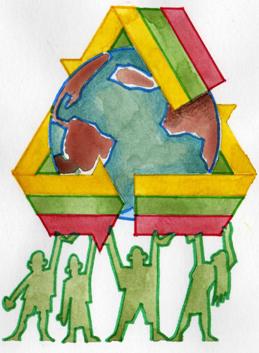
There is over a million of people of Lithuanian origin living outside Lithuania. Having left their motherland in different times and of different reasons they are now living and working in countries around the world. Many of them became successful businessmen: owners or managers of big corporations and companies or highly ranked experts in different fields.
Establishing of a closer relationship with Lithuanians living abroad should nowadays be one of the most important goals in the strategy of our government. The diasporas represent an invaluable source which can enrich Lithuania and help to create a better future of our country.
The goal of the World Lithuanian Economic Forum is to attract Lithuanian business people, economists, politicians and scientists from the entire world into Lithuania’s economic life of today, to strengthen their relations with Lithuania, to encourage them to develop business in our country, to help attract investments, to enterprising growing Lithuanian companies, to create a global network of Lithuanians from all over the world.
The Forum is organized by Lithuanian Business Confederation | ICC Lithuania in cooperation with a number of partners – governmental institutions as well as business companies.
The first Forum, named “Competitive Lithuania: innovative economy, effective business development and investment”, was organized in 2009 in Vilnius. In 2010 WLEF “High tech innovation & investment: local to global” was held in London. Both events got loads of attention from public and media. Following the traditions this year WLEF comes back to Vilnius and will be held 4 – 5 July.
The main theme of his year’s event is the creation of a competitive state. Experts, business people and scientists of different spheres from all over the world will discuss the vision of the world and Lithuania in ten years, the creation of competitiveness through innovations, a partnership between business and science, the encouragement of starting and growing businesses.
For registration and additional information: http://www.plef.lt/
- Bookmark :
- Digg
- del.icio.us
- Stumbleupon
- Redit it
Lithuania has got its own Bill Clinton!
- Posted by - (1) Comment
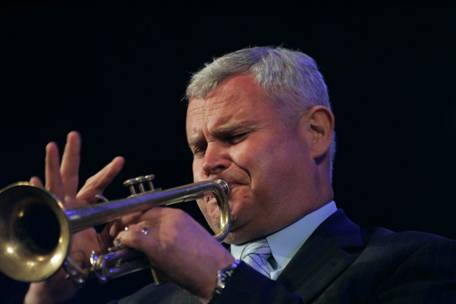
This weekend Klaipeda’s new Mayor, Vytautats Grubliauskas, greeted guests from Lithuania’s international community with jazz trumpet virtuosity, also singing Louis Armstrong’s ‘What a wonderful World’ very convincingly.
'The Singing Mayor' has introduced a completely new and refreshing sound into Lithuania's political life. A human face with a good ability to communicate with the audience through song and music. This bodes well and should be a source of inspiration for many!
Former U.S. President Bill Clinton became the world's most famous ‘jazz politician’, when he already during the election campaign in 1992 hit new tunes for U.S. politics, playing his tenor saxophone in a very convincing manner.
Lithuania has its own jazz politician through Klaipeda's newly elected mayor, VytautasGrubliauskas, who sings and plays trumpet in a top professional manner, latest for a large group from Lithuania's international community at an event in Klaipeda this weekend, when members of the British Chamber of Commerce in Lithuania took the road to the coast to a joint programme with the coastal city's international business organization.
The truth is that Mayor Grubliauskas for many years was one of Western Lithuania’s leading jazz musicians, known as the principal soloist of the Doudi Jazz Band from Klaipeda, famous for his trumpet playing and singing with a raspy voice that gave him the nickname ‘Lithuanian’s Louis Armstrong’. For many years Vytautas Grubliauskas shared his time and energy between performing and wide-ranging public activities, as a long-time president of the Klaipėda Jazz Club, Associate Professor and Head of the Jazz Department at the Klaipėda University, artistic and executive director of the Klaipėda Jazz Festival (now as a patron), and finally as a member of Seimas (Lithuania’s parliament) before winning the latest municipal elections and taking the post as Mayor of Klaipeda last month.
I have the suspicion that Mr. Grubliauskas will become internationally known as 'Lithuania’s Singing Mayor', after he introduced a completely new and refreshing sound into Lithuania's political life to the country’s international community this weekend. A human face with a good ability to community with the audience through song and music. This bodes well and should be a source of inspiration for many!
VilNews will revert with a comprehensive coverage of Klaipeda later in June, including an interview with the new Mayor, where we will be discussing politics, society, business, energy, tourism, culture and new visions for the coastal city and the region it is the capital for.
And for all of you who love jazz, please note that Klaipeda’s world famous Jazz Festival takes place the weekend of 3 – 5 June. If you are lucky also you may then be able to listen to ‘Lithuania’s Singing Mayor’!
Read more about the Jazz Festival at http://www.jazz.lt/festival/index.php?lang_id=2


A boat trip is a must when you visit Klaipeda. So also when members of the British Chamber of Commerce in Lithuania this weekend took the road to the coast for a joint programme with the coastal city's international business organization.
- Bookmark :
- Digg
- del.icio.us
- Stumbleupon
- Redit it
- Posted by - (5) Comment
![]()
(means “let’s be together”)
“I challenge all of us to volunteer”
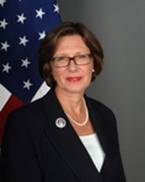 |
 |
Ambassador Anne E. Derse: “The U.S. Embassy is honoured
to be the patron of “Būkime kartu” this year.
On Saturday 28th of May over 100 children from local orphanages will participate in “Būkime kartu 2011”, organized by the international community in Lithuania, including U.S. and other foreign embassies, Lithuanian public institutions and volunteers. The programme is intended to provide the children needed personal attention and care, and to promote the virtues of volunteering in Lithuania.
This event involves more than 150 volunteers from foreign embassies, private companies and public institutions and is under the patronage of the U.S. Ambassador to Lithuania, Anne E. Derse. “The U.S. Embassy is honoured to be the patron of “Būkime kartu” this year. 2011 is the “European Year of the Volunteering” in the European Union, and volunteerism is a value that is strongly held in Lithuania. In the United States as well, we have long believed that service to the community and work done for the greater good is part of the foundation of a stable, free and productive society. I challenge all of us to continue exploring ways to volunteer, give back and make a positive contribution to our communities,” said Ambassador Anne E. Derse, the patron of the event.
Mr. Torben Pedersen, Chairman of the “Būkime kartu” Committee under Vilnius International Club said: “2011 is the 9th year that “Būkime kartu” has been organized on the initiative of Vilnius International Club. It’s a full day of fun and learning, not only for orphans, but also for the many volunteers that made the event happen. Volunteering brings a special experience, which tried once gives an impressive understanding and responsibility for caring for each other. This is what drives us to continue with the event year after year”.
As a special recognition for outstanding contribution to support children of Lithuania, Vilnius International Club has introduced a “Volunteer of the Year” award this year, which will be announced at the event.
During the event children will learn how fire engine works, how police and customs dogs are trained, what equipment has army vehicle or crime lab. These and many other questions will be answered by firemen, army officers, policemen, customs officers and by participation in involving games. Participating children will enjoy many outdoor activities and team games such as a bouncy castle, face-painting, parachute game, spider web, hot air balloon lift and more. There will also be a special appearance by players from BC Lietuvos Rytas, who will provide some basketball lessons for children.
Various organizations have generously offered their support to the event, without which the event would not have been possible, including: Vilnius International Club, US Embassy, Swedish embassy, Danish embassy, Norwegian embassy, Turkish embassy, Bulgarian embassy, Deloitte Lietuva, COWI Lietuva, Rimi Lietuva, Tarptautinė Teisės ir Verslo Aukštoji Mokykla (TTVAM), Viva Green Resort, Ūkio Bankas, Policijos departamentas prie VRM, Vilniaus apskrities vyriausiasis policijos komisariatas (Vilnius County Police Headquarters), Lietuvos Respublikos muitinė (Customs of the Republic of Lithuania), Priešgaisrinės apsaugos ir gelbėjimo departamentas prie VRM (Fire and Rescue department) , Lietuvos kariuomenė (Lithuanian Army), Medicina Magna, Multidora, Pentland, Radisson Blu Astoria, Radisson Blu Lietuva, DnB Nord, Oreivystės centras, McDonald’s, Rokiškio sūris, Antakalnio vidurinė mokykla, Lietuvos socialinės gerovės asociacija (LSGA), BRB Consulting Development, IC Baltic and BC Lietuvos Rytas.
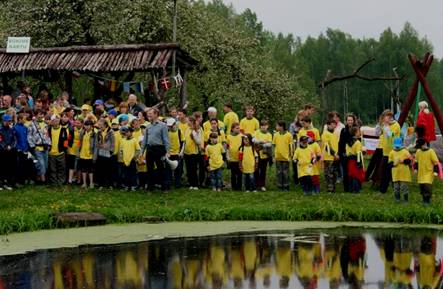
From “Būkime kartu 2010”
The event will take place in the beautiful Viva Green Resort, located 25 km away from Vilnius in Tuščiaulių village, Nemenčinė from 10.00 AM to 4.00 PM on Saturday, May 28th. For a map see http://www.vivagreenresort.lt/kaip_mus_rasti
For more information please contact: Lina Pradkeliene, Phone: +370 5 255 3030, mobile: +370 687 49856 Email: lpradkeliene@deloittece.com
Event program
|
Time |
Activity |
|
10.00-10.15 |
Opening talk |
|
10.15-11.00 |
Face painting |
|
10.20-13.00 |
Police bus, police cars and criminalist laboratory, Fire engine, Army cars, Basketball clinic Team games: castle jump, parachute, elephant feet, cup tower, crazy volley, obstacle course, spider web |
|
11.00-12.30 |
Air balloon lifts |
|
13.00-13.30 |
Police dogs and customs dogs show . Police mate Amsis. |
|
13.30-14.15 |
Lunch |
|
14.15-16.00 |
Police bus, police cars and criminalist laboratory, Fire engine, Army cars, Basketball clinic Team games: castle jump, parachute, elephant feet, cup tower, crazy volley, obstacle course, spider web |
|
16.00 |
Cake, coffee, tea |
|
16.10 |
Closing ceremony |
|
16.20 |
Volunteer of the year Award |
|
16.45 |
End of event |
- Bookmark :
- Digg
- del.icio.us
- Stumbleupon
- Redit it
- Posted by - (1) Comment
This can happen if or
when Greece falls

Photo: Dimitri Messinis / SCANPIX / AP
Despite the fact that Greece last year was allocated 110 billion Euros in crisis loan from the EU and the IMF, little has gone in the right direction for the embattled country.
More and more people believe that it is no longer question whether, but when Greece falls. Overall, Greece has total loans of 340 billion Euros.
Several experts expect a collapse in the next few days, writes Swedish Affärsvärlden.
Record Interest
Interest rates for the Greek government debt continues to rise this week, despite the fact that the government met to discuss yet another tightening package. The yield on ten-year government bonds rose to 16.8 percent, the highest level in the Euro zone’s history. The yield on two-year government bonds rose to 25.6 percent.
- There is much bad news out there. We have our doubts about the European cut plans, and its weaker economic data all over. The only thing that has pushed up the stock market is that the earnings season is now ending. It means that people will pull their money away from risk, "said Paul Zemsky at ING Investment Management told Bloomberg.
Refusing to accept the Greek government securities?
Several key players have said that banks will soon not accept Greek government securities as collateral. It will mean that the Greek banking system will be left without funding opportunities.
Economist and columnist Andrew Lilico on his blog made a summary of what he thinks happens when Greece, probably in the next few days, will be unable to meet its payment obligations.
Swedish Affärsvärlden says this is no reading for the timid…
British economist
It is when, not if

Andrew Lilico
Andrew Lilico’s predictions in ‘The Telegraph’:
It is when, not if. Financial markets merely aren’t sure whether it’ll be tomorrow, a month’s time, a year’s time, or two years’ time (it won’t be longer than that). Given that the ECB has played the “final card” it employed to force a bailout upon the Irish – threatening to bankrupt the country’s banking sector – presumably we will now see either another Greek bailout or default within days.
What happens when Greece defaults. Here are a few things:
- Every bank in Greece will instantly go insolvent.
- The Greek government will nationalise every bank in Greece.
- The Greek government will forbid withdrawals from Greek banks.
- To prevent Greek depositors from rioting on the streets, Argentina-2002-style (when the Argentinian president had to flee by helicopter from the roof of the presidential palace to evade a mob of such depositors), the Greek government will declare a curfew, perhaps even general martial law.
- Greece will redenominate all its debts into “New Drachmas” or whatever it calls the new currency (this is a classic ploy of countries defaulting)
- The New Drachma will devalue by some 30-70 per cent (probably around 50 per cent, though perhaps more), effectively defaulting 0n 50 per cent or more of all Greek euro-denominated debts.
- The Irish will, within a few days, walk away from the debts of its banking system.
- The Portuguese government will wait to see whether there is chaos in Greece before deciding whether to default in turn.
- A number of French and German banks will make sufficient losses that they no longer meet regulatory capital adequacy requirements.
- The European Central Bank will become insolvent, given its very high exposure to Greek government debt, and to Greek banking sector and Irish banking sector debt.
- The French and German governments will meet to decide whether (a) to recapitalise the ECB, or (b) to allow the ECB to print money to restore its solvency. (Because the ECB has relatively little foreign currency-denominated exposure, it could in principle print its way out, but this is forbidden by its founding charter. On the other hand, the EU Treaty explicitly, and in terms, forbids the form of bailouts used for Greece, Portugal and Ireland, but a little thing like their being blatantly illegal hasn’t prevented that from happening, so it’s not intrinsically obvious that its being illegal for the ECB to print its way out will prove much of a hurdle.)
- They will recapitalise, and recapitalise their own banks, but declare an end to all bailouts.
- There will be carnage in the market for Spanish banking sector bonds, as bondholders anticipate imposed debt-equity swaps.
- This assumption will prove justified, as the Spaniards choose to over-ride the structure of current bond contracts in the Spanish banking sector, recapitalising a number of banks via debt-equity swaps.
- Bondholders will take the Spanish Banking Sector to the European Court of Human Rights (and probably other courts, also), claiming violations of property rights. These cases won’t be heard for years. By the time they are finally heard, no-one will care.
- Attention will turn to the British banks. Then we shall see…
Andrew Lilico is an Economist with Europe Economics, and a member of the Shadow Monetary Policy Committee. He was formerly the Chief Economist of Policy Exchange.
Sources: http://www.dn.no/
and: http://blogs.telegraph.co.uk/finance/andrewlilico/100010332/what-happens-when-greece-defaults/
- Bookmark :
- Digg
- del.icio.us
- Stumbleupon
- Redit it
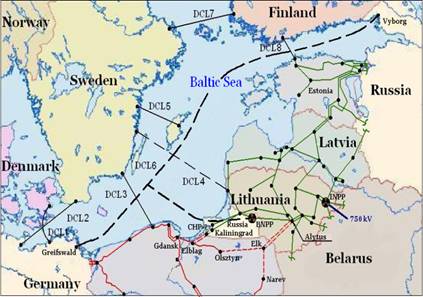
Energy infrastructure in the Baltic areas
By Aage Myhre, Editor-in-Chief
We described in yesterday's VilNews how the big powers France, Germany, Poland, and Russia now seem to be moving into a better climate of cooperation among themselves. We suggested in this context that Lithuania and the other Baltic States once again could become victims of the great powers' actions, and we recommended a much closer cooperation with the Nordic countries (Scandinavia) as the best and safest solution for Lithuania, Latvia and Estonia in the future. See also articles below.
The Baltic countries should, in my opinion, cooperate closely on a common approach to Scandinavia, and they should do their utmost to become independent of gas, oil and electricity from Russia – as soon as possible.
Lithuania already pays 40% more for gas bought from Gazprom than what Germany pays for the same gas, and there is little doubt that Russia is doing everything possible to prevent the Baltic States from developing their own energy sources. Russia has already taken a number of worrisome, significant steps to maintain and enhance its energy monopoly here.
The Baltic States may soon be even more squeezed and caught in a trap if the Nordic countries and the EU do not do more to help in achieving a much higher degree of independence from Russian energy.
The aspect of altered safety and balance in this region could easily be the next step, and we think the Baltic States, the Nordic countries and EU should look very carefully into this situation.
Here are two of the comments we have received to our yesterday's issue of VilNews:
|
|
Lithuania's hostile neighbourhood As an American, witnessing current American- Israeli discussions re: 1967 War boundaries. I would remain cautious about Obama's commitment to the Baltic nations. Kudos to Grybauskaite's remarks in 2010. Grybauskaite should be prepared to reiterate the need to validate past disclosures of US-NATO defense commitments to Lithuania, Latvia, Estonia. Just as there should be no illusions about the hostile neighborhood surrounding Israel, there must be no illusions re: Russian foreign policy affecting the Baltics and Poland. |
|
|
The true export of Russia is wholesale corruption, all-out cynicism
Aage, greetings. While in no way disputing the main thesis of your piece, I would like to supply a quick comment on its opening posit, concerning the "potential new alliance between France, Germany, Poland and Russia." Russia, I am afraid, is the odd man out in that suppositional constellation. It is, at present, a less than benign autocracy, and its economic model can only be described as unmitigated kleptocracy. 60-70% of its hard-currency revenue is due to oil and gas export, it is the world's third-largest international supplier of mineral resources, and so some of the more energy-dependent European countries, willy-nilly, exercise a cravenly "pragmatic" approach in their bilateral relations with Russia's ruling regime, agreeing to turn a blind eye even to some of its more blatant violations of human rights and economic freedoms. This is a country with no free elections, no freedom of press, no opposition figures ever allowed access to television; this is one of the most dangerous places on earth to be an independent journalist: the murder incidences among that category of people is very high indeed.
According to the Transparency International annual state-corruption ratings, Russia currently occupies the 154th spot out of the total of 178 on their: still ahead of Somalia, yet -- just as an example -- lagging behind Nigeria. And that's the true export of Russia, in the grand scheme of things: wholesale corruption, all-out cynicism. It is, in all, a shameful, thoroughly failed place, right now, I'm sad to say.
- Bookmark :
- Digg
- del.icio.us
- Stumbleupon
- Redit it
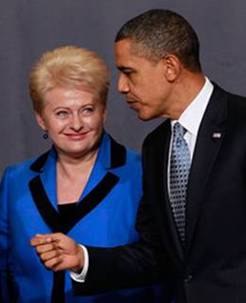
The president of Lithuania, Dalia Grybauskaite,
and president of the United States of America, Barack Obama.
USA's president, Barack Obama, visits Europe this week. Ireland, England, France and Poland are on his programmer on this trip to Europe, the 9th as U.S. president.
Obama's weeklong tour is all about tending to old friends in the Western alliance and securing their help with daunting challenges, from the political upheaval in the Mideast and North Africa to the protracted war in Afghanistan.
A priority for the president and his allies will be to more clearly define the West's role in promoting stability and democracy in the Arab world without being overly meddlesome and within tight financial limitations.
A highlight of Obama's opening stop in Ireland will be a pilgrimage to the hamlet of Moneygall, where Obama will explore his Irish roots. Fulmouth Kearney, who immigrated to the United States in 1850 at the age of 19, is the third great-grandfather of Obama on his white, Kansas-born mother's side. Obama, whose father was born in Kenya, will connect in Moneygall with distant relatives from the Irish branch of his family tree.
After his one day in Ireland, he will spend two in England, where he and first lady Michelle Obama will be treated to all the pomp and pageantry that the monarchy can muster for the president's first European state visit. The Obamas even get a Buckingham Palace sleepover.
Heather Conley, director of the Europe programme at the private Centre for Strategic and International Studies, said Obama's stop in Britain could help "put the 'special' back into the U.S.-U.K. special relationship."
In private, Obama and British Prime Minister David Cameron will plunge into the details of a host of international challenges on which the U.S. and Britain have worked together: Afghanistan, Libya, counterterrorism, the global economy and more.
Both leaders then scoot to a French summit of the Group of Eight industrialized nations, where the president hopes to build on momentum from his speech days ago about how best to promote stability and democracy in the Middle East.
Obama has called on the World Bank and International Monetary Fund to present the G-8 with an ambitious plan to help Egypt and Tunisia, in particular, recover from the disruptions caused by their democratic revolutions and prepare for elections later this year.
During his two-day stay in Deauville, France, Obama will take time for one-on-one meetings on the side of the G-8 with several world leaders, including Russian President Dmitry Medvedev and Japanese Prime Minister Naoto Kan.
Poland and Central Europe
Obama's visit to Poland is emblematic of a growing front in the administration's engagement in Europe, as the U.S. expands its economic and security relationship with Central European nations.
Obama will focus on energy cooperation, including shale gas development, when he visits NATO partner Poland for the first time, a US diplomat said last week in Warsaw.
"Energy is a pillar of Polish-American relations and it is sure to be the subject of discussions when President Obama visits Warsaw," US ambassador Lee Feinstein told delegates to a shale gas conference. Global fuel giants are exploring Poland's shale gas deposits, which a recent US study pegged as having a potential 5.3 trillion cubic metres of natural gas which could last some 300 years.
The U.S. has become a global leader in the production of natural gas extracted from shale, boosting its energy security, driving down prices and making it an exporter. Poland hopes it could reap similar benefits. However, experts insist that with exploration in the very early stages, it is too soon to gauge commercial viability.
Obama – Grybauskaite
In April 2010, Barack Obama and his Russian counterpart Dmitry Medvedev signed a new arms reduction treaty in Prague, primarily with regards to the Eastern European missile defence system that had been planned by the Bush administration,
After the signing, President Obama invited the presidents of Lithuania, Latvia, Estonia, and Romania, as well as the prime ministers of Poland, Czech Republic, Bulgaria, Croatia, Hungary, Slovakia and Slovenia to attend a dinner with him in Prague.
Lithuanian President Dalia Grybauskaite openly disagreed with Obama on the new reduction plan, claiming it harmed Lithuanian security, and in perhaps the most shocking move refused to take part in the dinner in Prague. Grybauskaite was the only invited president who refused to meet with Obama.
Since becoming Lithuania's president in 2009, Grybauskaite has wasted no time defining her leadership. "Yes, you have to be a strict and loud partner if you want to be heard in the conversation," she told The Associated Press in an interview this winter.
"Lithuania is not used to a straightforward, terse, forceful way of making statements. I admit using this style in pushing NATO defense plans for the Baltic States," she said, referring to U.S. cables released by WikiLeaks earlier this year, showing that NATO in January 2010 privately decided to expand a NATO defense plan for Poland to also cover Estonia, Latvia and Lithuania.
"I am afraid that if I had chosen a different tone, Lithuania and its neighbours would be still waiting another six years for these," she said to the Associated Press, giving herself credit for USA’s and NATO’s new strategy as revealed by WikiLeaks.
President Obama has invited the same state leaders for a dinner by the end of this week, now in Poland, and we understand that this time President Grybauskaite has accepted the invitation.
It still remains to see how President Grybauskaite’s ‘reflections’ vs. the Obama administration in 2010 and NATO now in 2011 are being treated and responded to by the said parties. We can only hope they are not given too much weight and that the relationships with Lithuania have not been harmed. Her acceptance of this year's invitation from Obama, and the absence of new provocative statements, suggest that she has adopted a more conciliatory and diplomatic style and line.
The right to disagree and discuss any topic should always remain free and open, but I think our president would be better off by following more recognized protocol procedures when such delicate issues are to be discussed at the highest international level.
To have a best possible relationship with the U.S. and the Obama administration is important for Lithuania, and one can only hope that his visit to Europe and Poland will come to represent a positive step towards improved dialogue and cooperation also between Lithuania and the United States.
Aage Myhre, Editor-In-Chief
- Bookmark :
- Digg
- del.icio.us
- Stumbleupon
- Redit it
By Tanushree Poddar, Deccan Chronicle, South India
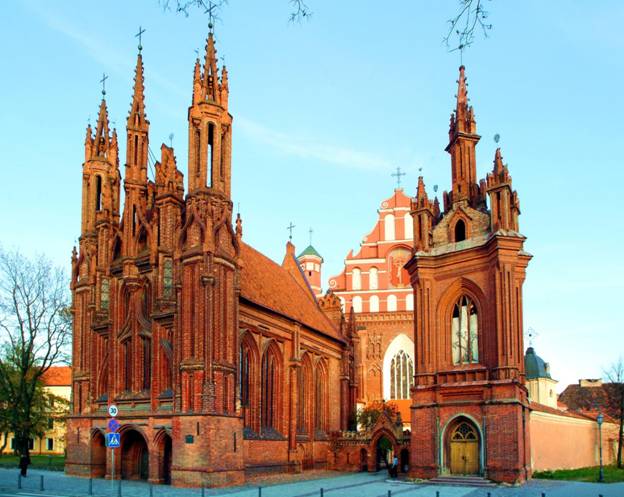
St. Anne’s Church in Vilnius.
Photo: www.travel.lt
When Napoleon saw this church, he wanted to carry it away with him on the palm of his hand and gift it to his sweetheart, Josephine,” our guide informed us with a twinkle in her eyes. “Thankfully, he could not fulfill his wishes and the church still remains in Vilnius.” I was not surprised.
I would have liked to carry the stunning church home, too. St. Anne’s church evokes covetousness in all breasts. It is so beautiful. Vilnius, the capital of Lithuania, is an artist’s dream. With its emerald forests, cobalt lakes, cerise spires and pine scented air, it is a romantic paradise. Apart from lovely landscape, it has some of the most beautiful churches I have ever seen.
Read more at:
http://www.deccanchronicle.com/tabloid/sunday-chronicle/travel/romantic-paradise-187
The Deccan Chronicle is a daily newspaper published through the Andhra Pradesh, Karnataka, and Tamil Nadu states of India. It is published in English, and is the largest circulation English-language newspaper in the south of India. The newspaper's name derives from the originating place Deccan regions of India.
- Bookmark :
- Digg
- del.icio.us
- Stumbleupon
- Redit it
A city of dreams…
- Posted by - (2) Comment
A truly exceptional project is being created just 20 km north of Vilnius city – to build a 'City of Dreams' next to the Le Méridien Vilnius, that already today includes a 194-room hotel, a spa, a pool, restaurants, cafés, a huge conference centre – as well as an amazing 18 hole golf course…

Upon completion, the 'City of Dreams' will include;
· A residential village
· Tropical beach and spa, with indoor to outdoor infinity pools
· Indoor multifunction leisure centre, with basketball, volleyball and tennis courts
· Casino, cinema, boutique shops, delicatessen and a family zoo
· Medical centre, offices, penthouses, themed restaurants
Today's Le Méridien Vilnius includes a 194-room hotel, an 18-hole golf course, an indoor pool, spa centre, restaurants and more amidst 350 acres of lush countryside with pine and birch forests:
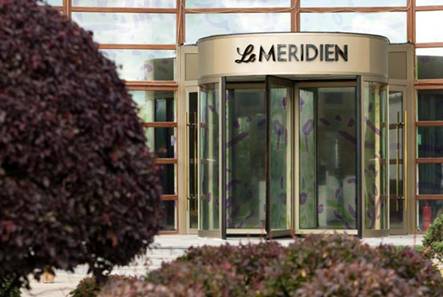

Le Méridien Vilnius overlooks two scenic lakes.

The V Golf Club is situated among beautiful grounds adjacent to the hotel. A magnificent 18 hole championship golf course.

A six-story conference centre, 8000 sq. m., for conferences, seminars, banquets, weddings…. 25 halls in classical design, of various size.

Restaurants with picturesque landscapes and soothing background music, gives a romantic and stylish environment where time freezes. Seasonal menus based on European cuisine with French accent.

The spacious pool, spa and wellness centre offers plenty of natural light and is surrounded by beautiful landscapes to be enjoyed all seasons.
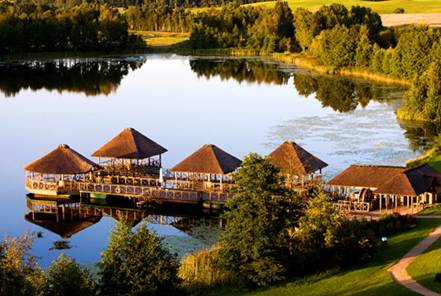
Fresh air, enchanting scenery and shimmering lakes creates a great atmosphere for warm memories.
- Bookmark :
- Digg
- del.icio.us
- Stumbleupon
- Redit it
Optimism back in the residential sector!
- Posted by - (0) Comment
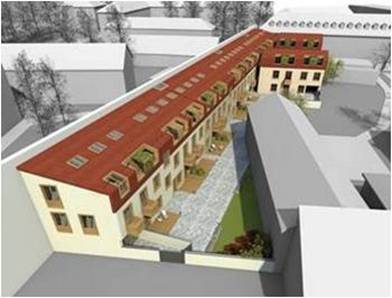
"Kotrynos vartai", a residential project in Vilnius Old Town.
More than 4.000 sq m. Building works already started.
Today's real estate updates by
NEWSEC – Re&Solution www.newsec.lt
Residential Sector: Optimism has returned to the market. Increasing number of pre-sale agreements in the project market indicates shrinking supply. Potential buyers are mostly looking for projects with good infrastructure – schools, kindergartens, public transportation services etc. in the neighbourhood.
Office Sector: There is lack of new companies in the market. Existing companies are very cautious regarding expansion. Landlords have started a new wave of re-negotiations, trying to increase rental rates.
Retail Sector: Turnover have stabilized and major retailers have started to report slight growth over the first quarter of this year. Retail sector returns back on a positive path!
Warehouse Sector: Warehouses are still fully stocked with goods. It is expected that recovery in consumption and growth of retail turnover will be followed by warehouse sector upturn.
- Bookmark :
- Digg
- del.icio.us
- Stumbleupon
- Redit it
Bloodlands – Europe between Hitler and Stalin
- Posted by - (1) Comment

A book by history professor Anthony Snyder of Yale University
Hitler vs. Stalin: Who Killed More?
Who was worse, Hitler or Stalin?
Were these people victims of Stalin or of Hitler? Or both?
“Bloodlands makes clear that, if it hadn’t been for Hitler’s treachery in the spring of 1941, Stalin would have gladly remained a German ally. And it was not Germany alone that started the Second World War but Germany and the Soviets together, when they jointly invaded Poland, allowing the Nazis to finally catch up with a killing enterprise Stalin had already begun.”
- Charles Lewis, National Post, Canada
BLOODLANDS
Hitler vs. Stalin: Who Killed More?
Who was worse, Hitler or Stalin?
Were these people victims of Stalin or of Hitler? Or both?
A book by history professor, Anthony Snyder of Yale University has been brought to our attention and we think that the prospective this book gives on the enormous and tragic loss of life in Europe at the hands of Hitler and Stalin will be of interest to many of our readers.
Probably the best way to get you familiar with the book “BLOODLANDS” is to share with you some of the reviews.
To start with, here is a review by the author, Timothy Snyder, that appeared in THE NEW YORK REVIEW OF BOOKS.
http://www.nybooks.com/articles/archives/2011/mar/10/hitler-vs-stalin-who-killed-more/
He starts his review with the question - Hitler vs. Stalin: Who Killed More?
And ends his review with this question - Who was worse, Hitler or Stalin?
Were these people victims of Stalin or of Hitler? Or both?
Another review that appeared in THE NEW YORK REVIEW OF BOOKS is by Anne Applebaum. The review is titled - The Worst of the Madness
http://www.nybooks.com/articles/archives/2010/nov/11/worst-madness/?pagination=false
In her review she writes this comment:
“Snyder’s ambition is to persuade the West—and the rest of the world—to see the war in a broader perspective. He does so by disputing popular assumptions about victims, death tolls, and killing methods—of which more in a moment—but above all about dates and geography. The title of this book, Bloodlands, is not a metaphor. Snyder’s “bloodlands,” which others have called “borderlands,” run from Poznan in the West to Smolensk in the East, encompassing modern Poland, the Baltic states, Ukraine, Belarus, and the edge of western Russia. This is the region that experienced not one but two—and sometimes three—wartime occupations. This is also the region that suffered the most casualties and endured the worst physical destruction.”
From The New York Times Sunday Book Review is this review by Joshua Rubenstein who is the Northeast regional director of Amnesty International USA and a co-editor of “The Unknown Black Book: The Holocaust in the German-Occupied Soviet Territories.”
http://www.nytimes.com/2010/11/28/books/review/Rubenstein-t.html
His review which is titled “Europe Between Hitler and Stalin” begins with this statement:
“For most Americans, who remember World War II as beginning in 1941, it is necessary to recall that Europe had succumbed to an infatuation with violence long before the United States entered the conflict. Timothy Snyder, a professor of history at Yale, compels us to look squarely at the full range of destruction committed first by Stalin’s regime and then by Hitler’s Reich. Each fashioned a terrifying orgy of deliberate mass killing.”
And another review from Canada’s National Post’s, THEAFTERWORD literary section by Charles Lewis
http://arts.nationalpost.com/2011/01/28/bloodlands/
In his review Mr. Lewis writes:
“Bloodlands makes clear that, if it hadn’t been for Hitler’s treachery in the spring of 1941, Stalin would have gladly remained a German ally. And it was not Germany alone that started the Second World War but Germany and the Soviets together, when they jointly invaded Poland, allowing the Nazis to finally catch up with a killing enterprise Stalin had already begun.”
From the reviews you can see that this book is worth investigating. Professor Snyder casts a new perspective on the events of this period in this part of Europe. Another prospective is that this may be the first time that the total of all the tragic deaths of this period have been put in one book.
Vin Karnila, Associate Editor
- Bookmark :
- Digg
- del.icio.us
- Stumbleupon
- Redit it
VilNews e-magazine is published in Vilnius, Lithuania. Editor-in-Chief: Mr. Aage Myhre. Inquires to the editors: editor@VilNews.com.
Code of Ethics: See Section 2 – about VilNews. VilNews is not responsible for content on external links/web pages.
HOW TO ADVERTISE IN VILNEWS.
All content is copyrighted © 2011. UAB ‘VilNews’.

 Click on the buttons to open and read each of VilNews' 18 sub-sections
Click on the buttons to open and read each of VilNews' 18 sub-sections 

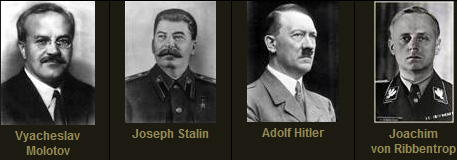






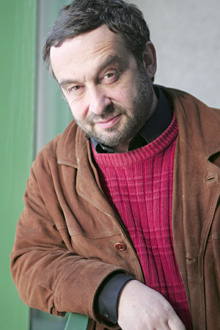









.jpg)



